Saturday, December 3, 2022
Parkinson's drug may substantially reduce chemo side effects
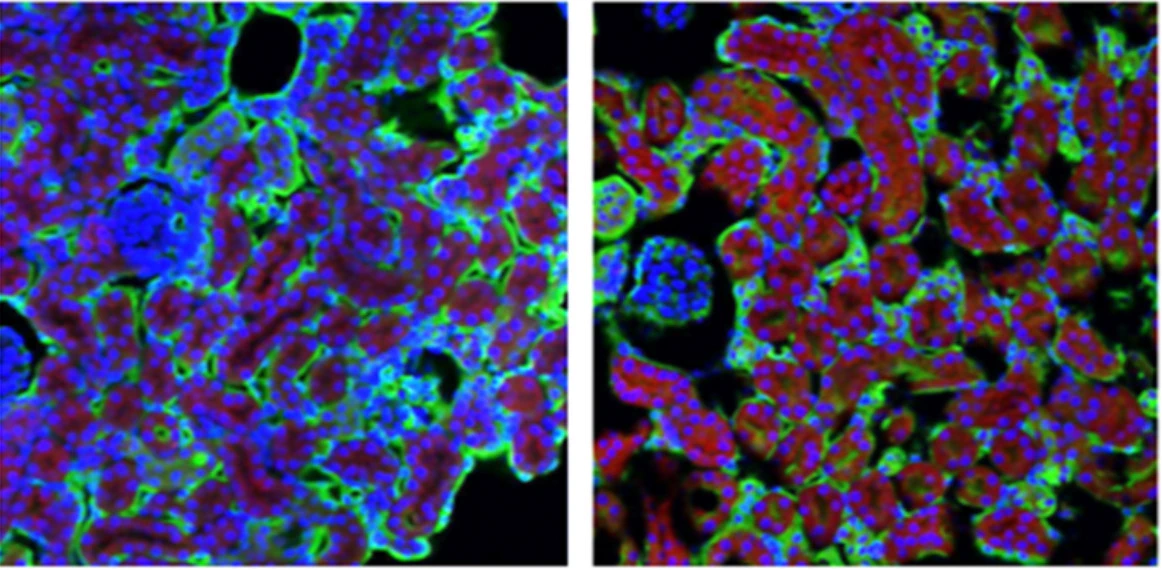
Left shows mouse kidney cells and the right shows
these same kidney cells after cisplatin treatment
revealing they are full of adenosine (red).
Image credit: Geoffroy Laumet
CANCER DIGEST – Dec. 3, 2022 – Researchers have found that a drug already FDA-approved for treatment of Parkinson’s disease may reduce some of the severe side effects of cisplatin, the gold standard chemotherapy drug for cancer.
The international research study conducted in mice was published in The Journal of Clinical Investigation published online Nov. 15, 2022. It showed that the drug istradefylline can reduce the side effects of cisplatin while preserving its cancer-fighting properties.
 |
| Left shows mouse kidney cells and the right shows these same kidney cells after cisplatin treatment revealing they are full of adenosine (red). Image credit: Geoffroy Laumet |
The international research study conducted in mice was published in The Journal of Clinical Investigation published online Nov. 15, 2022. It showed that the drug istradefylline can reduce the side effects of cisplatin while preserving its cancer-fighting properties.
Saturday, November 19, 2022
New immunotherapy approach promises to improve cancer outcomes
CANCER DIGEST – Nov. 19, 2022 – Researchers at Albert Einstein College of Medicine have identified an additional protein cancer cells use to blunt immune system attacks on tumors. The study results were published in The Journal of Clinical Investigation (JCI).
Over the past 10 years the introduction of immunotherapy medicines such as Keytruda and Opdivo have extended survival for patients with a number of cancers, including colorectal, lung and melanoma and bladder cancers, among others. These drugs work by blocking what are called checkpoint inhibitors, which cancer cells use to trick the immune system into ignoring them and not attacking.
CANCER DIGEST – Nov. 19, 2022 – Researchers at Albert Einstein College of Medicine have identified an additional protein cancer cells use to blunt immune system attacks on tumors. The study results were published in The Journal of Clinical Investigation (JCI).
Over the past 10 years the introduction of immunotherapy medicines such as Keytruda and Opdivo have extended survival for patients with a number of cancers, including colorectal, lung and melanoma and bladder cancers, among others. These drugs work by blocking what are called checkpoint inhibitors, which cancer cells use to trick the immune system into ignoring them and not attacking.
Over the past 10 years the introduction of immunotherapy medicines such as Keytruda and Opdivo have extended survival for patients with a number of cancers, including colorectal, lung and melanoma and bladder cancers, among others. These drugs work by blocking what are called checkpoint inhibitors, which cancer cells use to trick the immune system into ignoring them and not attacking.
Saturday, October 29, 2022
Cancer deaths continue to decline
.jpg?h=d7af4a70&itok=JGCMRw9s) CANCER DIGEST – Oct. 29, 2022 – Cancer deaths in the US continued to decline between 2015 and 2019 according to the latest Annual Report to the Nation on the Status of Cancer, published Oct. 27, 2022 in the journal Cancer.
CANCER DIGEST – Oct. 29, 2022 – Cancer deaths in the US continued to decline between 2015 and 2019 according to the latest Annual Report to the Nation on the Status of Cancer, published Oct. 27, 2022 in the journal Cancer.
“Today’s report is good news in our fight against cancer and is a reminder of the importance of President Biden’s Cancer Moonshot℠ initiative,” said Department of Health and Human Services Secretary Xavier Becerra. “I’m deeply impressed by the progress we’re making against cancer and firmly believe we can meet the President’s goal of reducing the death rate from cancer by at least 50% over the next 25 years. We can and must end cancer as we know it.”
.jpg?h=d7af4a70&itok=JGCMRw9s) CANCER DIGEST – Oct. 29, 2022 – Cancer deaths in the US continued to decline between 2015 and 2019 according to the latest Annual Report to the Nation on the Status of Cancer, published Oct. 27, 2022 in the journal Cancer.
CANCER DIGEST – Oct. 29, 2022 – Cancer deaths in the US continued to decline between 2015 and 2019 according to the latest Annual Report to the Nation on the Status of Cancer, published Oct. 27, 2022 in the journal Cancer.“Today’s report is good news in our fight against cancer and is a reminder of the importance of President Biden’s Cancer Moonshot℠ initiative,” said Department of Health and Human Services Secretary Xavier Becerra.
“I’m deeply impressed by the progress we’re making against cancer and firmly believe we can meet the President’s goal of reducing the death rate from cancer by at least 50% over the next 25 years. We can and must end cancer as we know it.”
Saturday, October 15, 2022
Clinical trial matching tool shortened time to consent by 55 days
Saturday, October 8, 2022
Lifelong stress may lead to higher risk of cancer death
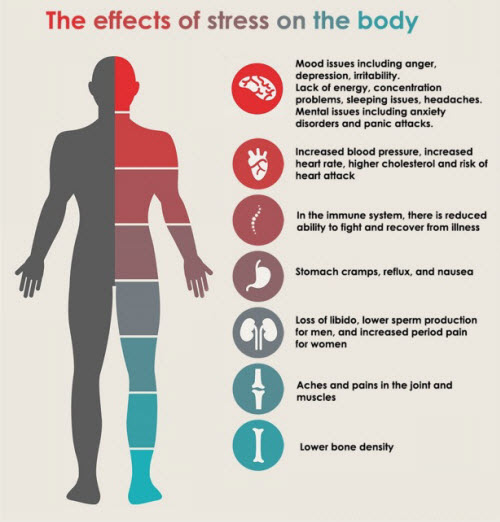
Image credit – Executive Medicine
CANCER DIGEST – Oct. 8, 2022 – Chronic, life-long stress increases the risk of dying of cancer, according to a new analysis of national health data.
The research was led by Dr. Justin Xavier Moor, an epidemiologist at the Medical College of Georgia and Georgia Cancer Center.
The study analyzed the effects of stress on cancer risk using data collected from 41,000 people who participated in the National Health and Nutrition Examination Survey (NHANES) between 1988 and 2019.
The results were published in the Sept. 2022 journal SSM Population Health.
 |
| Image credit – Executive Medicine |
The research was led by Dr. Justin Xavier Moor, an epidemiologist at the Medical College of Georgia and Georgia Cancer Center.
The study analyzed the effects of stress on cancer risk using data collected from 41,000 people who participated in the National Health and Nutrition Examination Survey (NHANES) between 1988 and 2019.
The results were published in the Sept. 2022 journal SSM Population Health.
Saturday, August 13, 2022
Older age, smoking and obesity raise cancer risk by as much as 29 percent
CANCER DIGEST – Aug. 13, 2022 – Older age and smoking are the strongest risk factors linked to developing any type of cancer, a new study shows.
The large study of nearly 430,000 people participating in two ongoing American Cancer Society studies showed that there were 15,226 invasive cancers among participants within five years of enrolling in the studies. The results were published in the Aug. 3, 2022 journal Cancer.
CANCER DIGEST – Aug. 13, 2022 – Older age and smoking are the strongest risk factors linked to developing any type of cancer, a new study shows.
The large study of nearly 430,000 people participating in two ongoing American Cancer Society studies showed that there were 15,226 invasive cancers among participants within five years of enrolling in the studies. The results were published in the Aug. 3, 2022 journal Cancer.
The large study of nearly 430,000 people participating in two ongoing American Cancer Society studies showed that there were 15,226 invasive cancers among participants within five years of enrolling in the studies. The results were published in the Aug. 3, 2022 journal Cancer.
Saturday, June 4, 2022
Counting cancerous lymph nodes could better predict survival

Counting the number of lymph nodes with cancercould be key indicator of survival Image credit SEER via Wikimedia Commons
CANCER DIGEST – June 4, 2022 – The number of cancerous lymph nodes is a best predictor of survival for 16 of the most common types of solid tumor cancers, a new analysis shows.
The researchers also found that patient mortality risk increased steadily with increasing number of cancerous lymph nodes.
 |
Counting the number of lymph nodes with cancer could be key indicator of survival Image credit SEER via Wikimedia Commons |
The researchers also found that patient mortality risk increased steadily with increasing number of cancerous lymph nodes.
Saturday, March 19, 2022
Could hydroxychloroquine make chemotherapy more effective in certain cancers?

Image credit – National Institutes of Health
CANCER DIGEST – March 19, 2022 – While it might not be an effective COVID-19 treatment, a new study suggests that the anti-malaria drug hydroxychloroquine might make a common chemotherapy treatment more effective for head and neck cancers.
Thrust into the headlines at the beginning of the COVID-19 pandemic as a potential treatment promoted by the former president of the US, hydroxychloroquine has been shown to breakdown tumor resistance to the chemotherapy drug cisplatin, long used to treat a variety of cancers, including head and neck cancers. The study results appeared March 14, 2022 in the Proceedings of the National Academy of Sciences.
 |
| Image credit – National Institutes of Health |
Thrust into the headlines at the beginning of the COVID-19 pandemic as a potential treatment promoted by the former president of the US, hydroxychloroquine has been shown to breakdown tumor resistance to the chemotherapy drug cisplatin, long used to treat a variety of cancers, including head and neck cancers. The study results appeared March 14, 2022 in the Proceedings of the National Academy of Sciences.
Friday, March 11, 2022
Tweaking cancer drug to target iron boosts effectiveness and reduces toxicity
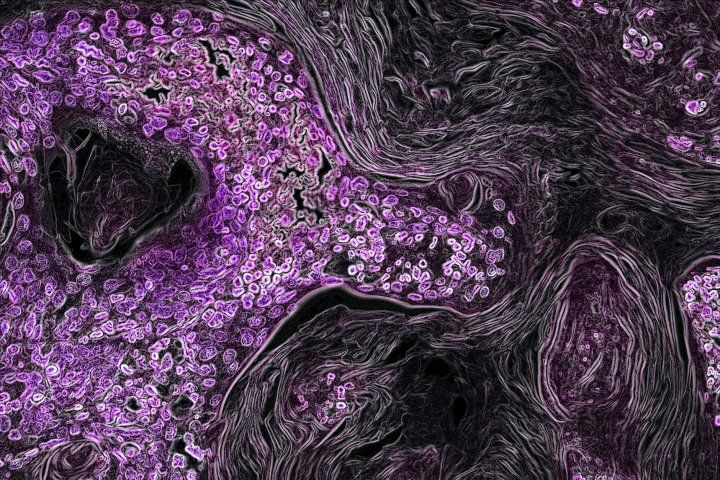
A microscopic image of KRAS-driven lung cancer (purple) in a
mouse model. Image credit – National Cancer Institute
CANCER DIGEST – March 11, 2022 – By tweaking an already FDA-approved cancer drug, researchers at the University of California San Francisco have opened up new therapies for cancers with a specific mutation that are particularly difficult to treat. The study appears in the March 9, 2022 Journal of Experimental Medicine.
 |
| A microscopic image of KRAS-driven lung cancer (purple) in a mouse model. Image credit – National Cancer Institute |
CANCER DIGEST – March 11, 2022 – By tweaking an already FDA-approved cancer drug, researchers at the University of California San Francisco have opened up new therapies for cancers with a specific mutation that are particularly difficult to treat. The study appears in the March 9, 2022 Journal of Experimental Medicine.
Saturday, February 26, 2022
Vegan diet appears to lower cancer risk
CANCER DIGEST – Feb. 25, 2022 – Vegetarians who eat no meat have a 14 percent lower risk of cancer compared to people who eat meat more than five times per week, according to a large observational study published Feb. 24, 2022 in the journal BMC Medicine.
Led by Cody Watling, a team of Oxford University researchers surveyed 472,377 British adults were participants in the UK Biobank, a large long-term study in the United Kingdom that is investigating genetic and environmental factors in the development of disease.
Participants who were between 40 and 70 years old were asked about their diets, specifically their consumption of meat and fish. After accounting for health conditions like diabetes, lifestyle, and socioeconomic factors the researchers calculated the incidence of cancer over an 11 year period.
CANCER DIGEST – Feb. 25, 2022 – Vegetarians who eat no meat have a 14 percent lower risk of cancer compared to people who eat meat more than five times per week, according to a large observational study published Feb. 24, 2022 in the journal BMC Medicine.
Led by Cody Watling, a team of Oxford University researchers surveyed 472,377 British adults were participants in the UK Biobank, a large long-term study in the United Kingdom that is investigating genetic and environmental factors in the development of disease.
Participants who were between 40 and 70 years old were asked about their diets, specifically their consumption of meat and fish. After accounting for health conditions like diabetes, lifestyle, and socioeconomic factors the researchers calculated the incidence of cancer over an 11 year period.
Led by Cody Watling, a team of Oxford University researchers surveyed 472,377 British adults were participants in the UK Biobank, a large long-term study in the United Kingdom that is investigating genetic and environmental factors in the development of disease.
Participants who were between 40 and 70 years old were asked about their diets, specifically their consumption of meat and fish. After accounting for health conditions like diabetes, lifestyle, and socioeconomic factors the researchers calculated the incidence of cancer over an 11 year period.
Saturday, February 12, 2022
Cancer patients under treatment more susceptible to Covid misinformation

Image credit–Virginia Commonwealth University
CANCER DIGEST – Feb. 12, 2022 – Cancer patients actively undergoing treatment were more likely to believe misinformation related to Covid-19 than cancer survivors or people with no cancer history, a new study shows.Researchers at the Virginia Commonwealth University led by Jeanine Guidry, PhD, director of the Media and Health Lab in the Cancer Prevention and Control research program conducted an online survey of 897 adults between June 1 and June 15, 2020.
 |
| Image credit–Virginia Commonwealth University |
CANCER DIGEST – Feb. 12, 2022 – Cancer patients actively undergoing treatment were more likely to believe misinformation related to Covid-19 than cancer survivors or people with no cancer history, a new study shows.Researchers at the Virginia Commonwealth University led by Jeanine Guidry, PhD, director of the Media and Health Lab in the Cancer Prevention and Control research program conducted an online survey of 897 adults between June 1 and June 15, 2020.
Saturday, December 11, 2021
New treatment boosts survival in high-risk neuroblastoma
CANCER DIGEST – Dec. 11, 2021 – Using a modified monoclonal antibody in combination with immunotherapy, chemotherapy, radiation therapy and stem cell transplantation, improved survival by 20 percent in children with high-risk neuroblastoma, results of a small clinical trial show.
Neuroblastoma is a rare cancer of immature nerve cells and is diagnosed in about 700 people, mostly children under age 5, in the U.S. each year according to the American Cancer Society.
CANCER DIGEST – Dec. 11, 2021 – Using a modified monoclonal antibody in combination with immunotherapy, chemotherapy, radiation therapy and stem cell transplantation, improved survival by 20 percent in children with high-risk neuroblastoma, results of a small clinical trial show.
Neuroblastoma is a rare cancer of immature nerve cells and is diagnosed in about 700 people, mostly children under age 5, in the U.S. each year according to the American Cancer Society.
Neuroblastoma is a rare cancer of immature nerve cells and is diagnosed in about 700 people, mostly children under age 5, in the U.S. each year according to the American Cancer Society.
Saturday, March 6, 2021
Walking pace may be linked to cancer survival

Photo credit – Washington University news
CANCER DIGEST – March 6, 2021 – Slow walking appears to be linked to higher risk of dying of any cause for patients who have survived cancer, a new study shows.
"To our knowledge, this analysis is the first to explore the relationship between cancer, walking pace and subsequent mortality in 15 different cancer types," said Elizabeth Salerno, PhD, who conducted this research while a postdoctoral researcher at the NCI. "Next steps include identifying the underlying reasons for these associations. It's possible that slow walking may be due to the cancer itself, adverse effects of treatment, or changes in lifestyle.
 |
| Photo credit – Washington University news |
"To our knowledge, this analysis is the first to explore the relationship between cancer, walking pace and subsequent mortality in 15 different cancer types," said Elizabeth Salerno, PhD, who conducted this research while a postdoctoral researcher at the NCI. "Next steps include identifying the underlying reasons for these associations. It's possible that slow walking may be due to the cancer itself, adverse effects of treatment, or changes in lifestyle.
Saturday, February 6, 2021
Fecal transplants boost response to immunotherapy in melanoma patients
CANCER DIGEST – Feb. 6, 2021 – Transferring some of the microorganisms in the intestines from patients whose melanoma responded to an immunotherapy drug into patients whose melanoma didn’t respond boosted the effect of the drug, according to results of a small pilot study to test the concept.
The researchers led by Giorgio Trinchieri, M.D. chief of the Laboratory of Integrative Cancer Immunology at the National Cancer Institute’s Center for Cancer Research conducted the study in 15 patients at the University of of Pittsburgh Hillman Cancer Center. The study appears in the Feb. 5, 2021 Science.
CANCER DIGEST – Feb. 6, 2021 – Transferring some of the microorganisms in the intestines from patients whose melanoma responded to an immunotherapy drug into patients whose melanoma didn’t respond boosted the effect of the drug, according to results of a small pilot study to test the concept.
The researchers led by Giorgio Trinchieri, M.D. chief of the Laboratory of Integrative Cancer Immunology at the National Cancer Institute’s Center for Cancer Research conducted the study in 15 patients at the University of of Pittsburgh Hillman Cancer Center. The study appears in the Feb. 5, 2021 Science.
The researchers led by Giorgio Trinchieri, M.D. chief of the Laboratory of Integrative Cancer Immunology at the National Cancer Institute’s Center for Cancer Research conducted the study in 15 patients at the University of of Pittsburgh Hillman Cancer Center. The study appears in the Feb. 5, 2021 Science.
Saturday, January 16, 2021
Cancer deaths see biggest one-year drop in history
CANCER DIGEST – Jan. 15, 2021 – Declining deaths from cancer set a record for a 1-year drop in the latest report by the American Cancer Society. The 2.4 percent decline from 2017 to 2018 was the fastest decline ever recorded.
The 2.4 percent drop in cancer deaths follows a steady 31 percent decline in cancer deaths over the past two decades from 1991 to 2018. The cancer death rate peaked in 1991 at 215 deaths per 100,000 people.
Despite the declining deaths, the report estimates that in the US in 2021, almost 1.9 million new cancers cases will be diagnosed and more than 600,000 people will die from the disease.
CANCER DIGEST – Jan. 15, 2021 – Declining deaths from cancer set a record for a 1-year drop in the latest report by the American Cancer Society. The 2.4 percent decline from 2017 to 2018 was the fastest decline ever recorded.
The 2.4 percent drop in cancer deaths follows a steady 31 percent decline in cancer deaths over the past two decades from 1991 to 2018. The cancer death rate peaked in 1991 at 215 deaths per 100,000 people.
The 2.4 percent drop in cancer deaths follows a steady 31 percent decline in cancer deaths over the past two decades from 1991 to 2018. The cancer death rate peaked in 1991 at 215 deaths per 100,000 people.
Despite the declining deaths, the report estimates that in the US in 2021, almost 1.9 million new cancers cases will be diagnosed and more than 600,000 people will die from the disease.
Saturday, November 14, 2020
Personalized vaccine trial showing early promise expands
Monday, November 9, 2020
How does exercise protect against cancer?
CANCER DIGEST – Nov. 9, 2020 – It has long been known that exercise provides a protective effect against a number of illnesses including cancer, but exactly what the biological mechanism is that underpins that effect has not been identified.
In new research in the journal eLife, Swedish researchers have shown that exercise stimulates certain metabolites that increase T cell activity, which could explain the protective effect of exercise.
CANCER DIGEST – Nov. 9, 2020 – It has long been known that exercise provides a protective effect against a number of illnesses including cancer, but exactly what the biological mechanism is that underpins that effect has not been identified.
In new research in the journal eLife, Swedish researchers have shown that exercise stimulates certain metabolites that increase T cell activity, which could explain the protective effect of exercise.
In new research in the journal eLife, Swedish researchers have shown that exercise stimulates certain metabolites that increase T cell activity, which could explain the protective effect of exercise.
Saturday, October 17, 2020
A breath test for cancer? It could happen

Photo credit Flinders University
CANCER DIGEST – Oct. 17, 2020 – A new Australian study has shown that head and neck cancers could be accurately identified 85 percent of the time with a breath sample taken before diagnostic testing.
The study involved 181 patients suspected of early-stage head and neck cancer before any treatment. A sample of each patient's breath was collected and then subjected to high-tech machine called flow-tube mass spectrometer. This is a machine that can separate molecules based on the mass of each individual electrically-charged molecule. In addition the researchers used statistical modeling to develop a breath test that could differentiate cancer from non-cancer molecules.
 |
| Photo credit Flinders University |
The study involved 181 patients suspected of early-stage head and neck cancer before any treatment. A sample of each patient's breath was collected and then subjected to high-tech machine called flow-tube mass spectrometer. This is a machine that can separate molecules based on the mass of each individual electrically-charged molecule. In addition the researchers used statistical modeling to develop a breath test that could differentiate cancer from non-cancer molecules.
Saturday, September 5, 2020
Hair dye does not increase risk of cancer
CANCER DIGEST – Sept. 5, 2020 – A lot of women whose hair color comes from a box can breathe a sigh of relief. After years of suspicion that the chemicals in such permanent hair dye carried health risks, including increased risk of cancer, a new study has found no increased risk linked to most cancers or to cancer deaths in women using the products.
The study involved 117,200 women from the long-running Nurses’ Health Study based at the Brigham and Women’s Hospital in Boston. Those women have been followed for 36 years with a variety of analyses coming from the data gathered over those years. The new analysis was published in the Sept. 2 British Medical Journal (BMJ)
CANCER DIGEST – Sept. 5, 2020 – A lot of women whose hair color comes from a box can breathe a sigh of relief. After years of suspicion that the chemicals in such permanent hair dye carried health risks, including increased risk of cancer, a new study has found no increased risk linked to most cancers or to cancer deaths in women using the products.
The study involved 117,200 women from the long-running Nurses’ Health Study based at the Brigham and Women’s Hospital in Boston. Those women have been followed for 36 years with a variety of analyses coming from the data gathered over those years. The new analysis was published in the Sept. 2 British Medical Journal (BMJ)
The study involved 117,200 women from the long-running Nurses’ Health Study based at the Brigham and Women’s Hospital in Boston. Those women have been followed for 36 years with a variety of analyses coming from the data gathered over those years. The new analysis was published in the Sept. 2 British Medical Journal (BMJ)
Friday, June 26, 2020
Vitamin D may be key to reducing side effect of new cancer drugs
CANCER DIGEST – June 26, 2020 – New research indicates that taking vitamin D supplements may help prevent one of the potentially serious side effects of a revolutionary form of anti-cancer therapy, called checkpoint inhibitors, a new study shows.
The findings are published early online in CANCER, a peer-reviewed journal of the American Cancer Society (ACS).
CANCER DIGEST – June 26, 2020 – New research indicates that taking vitamin D supplements may help prevent one of the potentially serious side effects of a revolutionary form of anti-cancer therapy, called checkpoint inhibitors, a new study shows.
The findings are published early online in CANCER, a peer-reviewed journal of the American Cancer Society (ACS).
Friday, June 19, 2020
Movers have lower risk of dying of cancer

Image credit – MD Anderson
CANCER DIGEST – June 19, 2020 – A new study shows that the most sedentary individuals had an 82 percent higher risk of dying of cancer compared to the least sedentary individuals.
Led by Susan Gilchrist M.D., associate professor of Clinical Cancer Prevention at the University of Texas MD Anderson Cancer Center the study involved a group of participants in the REGARDS study,
 |
| Image credit – MD Anderson |
Led by Susan Gilchrist M.D., associate professor of Clinical Cancer Prevention at the University of Texas MD Anderson Cancer Center the study involved a group of participants in the REGARDS study,
Friday, May 15, 2020
Say AAAH for oral cancer test
CANCER DIGEST – May 15, 2020 – A simple saliva test developed by Queensland University of Technology (QUT) has detected early throat cancer in a person who had no symptom and no clinical signs of cancer, QUT scientists report.
It is believed to be world's first non-invasive test to pick up HPV-DNA in a saliva sample from an infected healthy person.
CANCER DIGEST – May 15, 2020 – A simple saliva test developed by Queensland University of Technology (QUT) has detected early throat cancer in a person who had no symptom and no clinical signs of cancer, QUT scientists report.
It is believed to be world's first non-invasive test to pick up HPV-DNA in a saliva sample from an infected healthy person.
It is believed to be world's first non-invasive test to pick up HPV-DNA in a saliva sample from an infected healthy person.
Friday, May 8, 2020
Drug may help control nausea unrelated to chemo in patients with advanced cancer

Image courtesy Mayo News Network
CANCER DIGEST – May 8, 2020 – A drug used to treat nervous, emotional and mental conditions, such as schizophrenia, has been shown to be effective in easing nausea and vomiting unrelated to chemotherapy or radiation therapy in cancer patients.
The drug olanzapine was tested by Mayo Clinic researchers in 30 patients with advanced cancer who had not recently undergone chemotherapy or radiation but did have substantial trouble with nausea and vomiting.
 |
| Image courtesy Mayo News Network |
The drug olanzapine was tested by Mayo Clinic researchers in 30 patients with advanced cancer who had not recently undergone chemotherapy or radiation but did have substantial trouble with nausea and vomiting.
Saturday, March 21, 2020
Statins might starve cancer cells to death
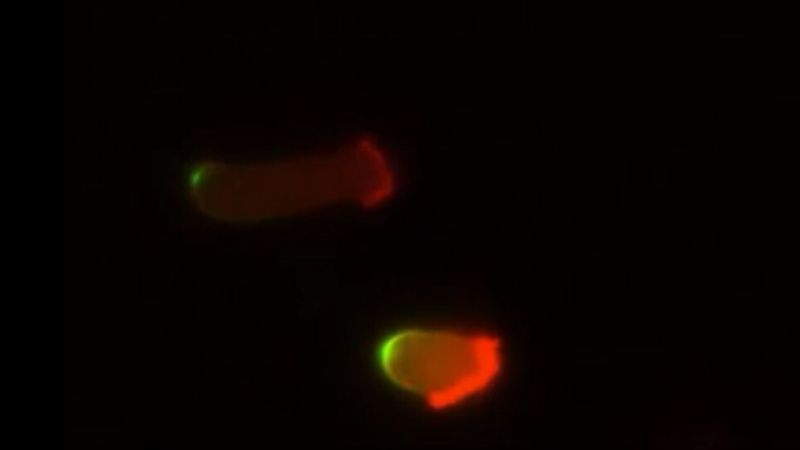
Microscopic view of cells that stop moving –
Credit: xiaoguang Li
CANCER DIGEST – March 21, 2020 – A drug that 35 million Americans already take daily may be effective in halting cancer growth, a new study shows.
The findings by researchers at Johns Hopkins Medicine confirm findings of population studies that have shown that people taking statin drugs to lower their cholesterol may gain a protective effect against cancer.
 |
| Microscopic view of cells that stop moving – Credit: xiaoguang Li |
The findings by researchers at Johns Hopkins Medicine confirm findings of population studies that have shown that people taking statin drugs to lower their cholesterol may gain a protective effect against cancer.
Saturday, March 14, 2020
Are cancer patients more susceptible to COVID-19?
Saturday, February 15, 2020
5 days of radiation for sarcomas as effective as 5 weeks

Researchers Dr. Fritz Eilber, left, and Dr. Anusha
Kalbasi, find shorter radiation for sarcoma is effective
CANCER DIGEST – Feb. 15, 2020 – Significantly shorter radiation treatments for cancer of soft tissues like muscle, nerves, fat or connective tissues, is safe and likely just as effective as conventional 5 week regimens, a new study shows.
Led by researchers at the UCLA Jonsson Comprehensive Cancer Center, 52 adults diagnosed with a soft tissue sarcoma of the limbs or trunk, where such tumors most commonly occur, participated in the study. The tumors had not spread to other parts of the body. The treatment consisted of a condensed form of radiation for 5 days, followed by surgery. The researchers then followed the patients for an average of two-and-half years.
 |
| Researchers Dr. Fritz Eilber, left, and Dr. Anusha Kalbasi, find shorter radiation for sarcoma is effective |
Led by researchers at the UCLA Jonsson Comprehensive Cancer Center, 52 adults diagnosed with a soft tissue sarcoma of the limbs or trunk, where such tumors most commonly occur, participated in the study. The tumors had not spread to other parts of the body. The treatment consisted of a condensed form of radiation for 5 days, followed by surgery. The researchers then followed the patients for an average of two-and-half years.
Saturday, January 11, 2020
Zapping cancer in a single treatment: FLASH therapy is feasible
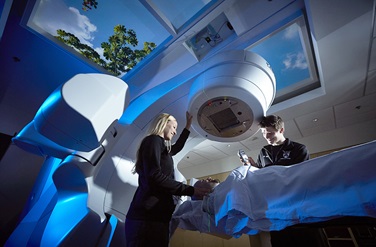
Photo credit–Roberts Proton Therapy Center
CANCER DIGEST – Jan. 11, 2020 – Imagine that one day in the not-too-distant future, your cancer is treated with an entire course of radiation delivered in a single one-second dose.
For current cancer patients who undergo their radiation treatments over the course of weeks, such a treatment might seem impossible, but researchers at Penn Medicine say they have demonstrated the ability to deliver an entire course of radiation in less than a second.
 |
| Photo credit–Roberts Proton Therapy Center |
For current cancer patients who undergo their radiation treatments over the course of weeks, such a treatment might seem impossible, but researchers at Penn Medicine say they have demonstrated the ability to deliver an entire course of radiation in less than a second.
Saturday, January 4, 2020
Single course chemo is effective for preventing testicular cancer
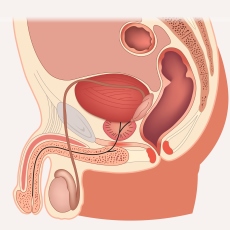
Image credit – MedlinePlus
CANCER DIGEST – Jan. 4, 2020 – Half the chemo is as effective as current regimens in preventing recurrence of testicular cancer after surgery, a new study has found.
The study led by the Institute of Cancer Research, London and University Hospitals Birmingham NHS Foundation trust involved nearly 250 men with early stage testicular cancer at high risk of their cancer returning. The results appear in the Jan. 1, 2020 journal European Urology
 |
| Image credit – MedlinePlus |
The study led by the Institute of Cancer Research, London and University Hospitals Birmingham NHS Foundation trust involved nearly 250 men with early stage testicular cancer at high risk of their cancer returning. The results appear in the Jan. 1, 2020 journal European Urology
Saturday, December 14, 2019
Women who can exercise vigorously live longer
CANCER DIGEST – Dec. 14, 2019 – Women who are able to exercise vigorously have a significantly lower risk of dying from heart disease, cancer and other causes, a new study shows.
The study involved 4,714 adult women who were referred to treadmill exercise and echocardiography due to known or suspected coronary artery disease.
CANCER DIGEST – Dec. 14, 2019 – Women who are able to exercise vigorously have a significantly lower risk of dying from heart disease, cancer and other causes, a new study shows.
The study involved 4,714 adult women who were referred to treadmill exercise and echocardiography due to known or suspected coronary artery disease.
The study involved 4,714 adult women who were referred to treadmill exercise and echocardiography due to known or suspected coronary artery disease.
Saturday, November 9, 2019
Any amount of running linked to longer life
CANCER DIGEST – Nov. 9, 2019 – The human body evolved to standing, walking and then running. And running seems to do a body good, according to new analysis of all the available data from 14 studies involving 232,149 people.
Published in the Nov. 4, 2019 British Journal of Sports Medicine the researchers found that any amount of running is linked to a significantly lower risk of death from any cause. Specifically any amount of running was associated with a 27 percent lower risk of death from all causes for both sexes compared to no running, a 30 percent lower risk of death from cardiovascular disease, and a 23 percent lower risk of death from cancer.
Published in the Nov. 4, 2019 British Journal of Sports Medicine the researchers found that any amount of running is linked to a significantly lower risk of death from any cause. Specifically any amount of running was associated with a 27 percent lower risk of death from all causes for both sexes compared to no running, a 30 percent lower risk of death from cardiovascular disease, and a 23 percent lower risk of death from cancer.
Continue reading
Friday, August 16, 2019
Confirmation that an apple a day will keep the doctor a way

Image courtesy of ECU
CANCER DIGEST – Aug. 16, 2019 -- A new analysis of data from a long-running Danish study shows that consuming flavonoid-rich items such as apples and tea protects against death from cancer and heart disease. What’s more the effect is particularly strong for smokers and heavy drinkers.
The analysis comes from the Danish Diet study, an observational study of 53,048 Danes followed by researchers at Edith Cowan University for the past 23 years. The results were published in the Aug. 13, 2019 issue of Nature Communications.
 |
Image courtesy of ECU
|
The analysis comes from the Danish Diet study, an observational study of 53,048 Danes followed by researchers at Edith Cowan University for the past 23 years. The results were published in the Aug. 13, 2019 issue of Nature Communications.
Saturday, July 20, 2019
Broken heart syndrome linked to cancer

Image by Sakazaki used under Creative Commons license
CANCER DIGEST – July 20, 2019 – While the headlines grab the attention of the romantically inclined, there really is a medical condition affecting the heart resulting from traumatic emotional events called takotsubo cardiomyopathy.
The new international study led by Swiss researchers in the Journal of the American Heart Association, shows that a substantial number of patients with takotsubo syndrome (TTS) have an increased risk of cancer.
 |
| Image by Sakazaki used under Creative Commons license |
The new international study led by Swiss researchers in the Journal of the American Heart Association, shows that a substantial number of patients with takotsubo syndrome (TTS) have an increased risk of cancer.
Saturday, July 13, 2019
Limiting sugary sodas and fruit drinks may lower cancer risk

Image used under
CreativeCommons license
CANCER DIGEST – July 13, 2019 – Sugary drinks are associated with an increased risk of cancer, especially breast cancer, a new observational study shows.
The study led by French researchers followed 101,257 health French adults over a maximum of 9 years. The participants completed at least two standardized questionnaires over the course of the study. They were asked about their usual intake of more than 3,000 different food and beverage items. The study appears in the July 10, 2019 British Medical Journal (BMJ).
Earlier studies have shown a link between sugar intake and obesity and visceral or gut fat that is stored around the liver and pancreas. Also links with sugary drinks with diabetes and inflammation are all linked to higher cancer risk.
 |
| Image used under CreativeCommons license |
The study led by French researchers followed 101,257 health French adults over a maximum of 9 years. The participants completed at least two standardized questionnaires over the course of the study. They were asked about their usual intake of more than 3,000 different food and beverage items. The study appears in the July 10, 2019 British Medical Journal (BMJ).
Earlier studies have shown a link between sugar intake and obesity and visceral or gut fat that is stored around the liver and pancreas. Also links with sugary drinks with diabetes and inflammation are all linked to higher cancer risk.
Saturday, July 6, 2019
Coffee burns brown fat, may help with weight control

Image courtesy University of Nottingham
CANCER DIGEST – July 5, 2019 – Chock up another benefit of drinking coffee. A group of British researchers have found that a cup of coffee can stimulate 'brown fat,' the body’s own fat-fighting defenses.
Brown adipose tissue (BAT) or brown fat is the "other" fat in your body. Brown fat plays an important role in burning calories for energy. The white fat most people think of or see when trimming a steak before cooking is stored by the body.
 |
| Image courtesy University of Nottingham |
Brown adipose tissue (BAT) or brown fat is the "other" fat in your body. Brown fat plays an important role in burning calories for energy. The white fat most people think of or see when trimming a steak before cooking is stored by the body.
Saturday, June 8, 2019
New imaging agent is able to identify 30 types of cancers

68Ga-FAPI PET/CT in patients reflecting
15 different tumor entities. Image Credit:
Kratochwil, Flechhsig, Lindner, et al
CANCER DIGEST – June 8, 2019 – A new imaging agent has been shown to be highly effective in identifying nearly 30 types of malignant tumors, according to a new study published in the Journal of Nuclear Medicine. The agent could be effective in providing physicians with a more complete picture of a patient’s cancer.
The agent called 68Ga-FPI is used in positron emission tomography/computed tomography or PET/CT and targets cancer-associated fibroblasts and is taken up by a wide variety of tumors in very high amounts, making them clearly stand out on an image study.
 |
| 68Ga-FAPI PET/CT in patients reflecting 15 different tumor entities. Image Credit: Kratochwil, Flechhsig, Lindner, et al |
The agent called 68Ga-FPI is used in positron emission tomography/computed tomography or PET/CT and targets cancer-associated fibroblasts and is taken up by a wide variety of tumors in very high amounts, making them clearly stand out on an image study.
Saturday, May 25, 2019
New guidelines call for more intense exercise for cancer patients
Saturday, April 20, 2019
More evidence that physical activity does a body good
 CANCER DIGEST – April 20, 2019 – Another study about physical activity and health has shown that increased physical activity of any type reduces overall risk of dying regardless of age, sex, or starting fitness level.
CANCER DIGEST – April 20, 2019 – Another study about physical activity and health has shown that increased physical activity of any type reduces overall risk of dying regardless of age, sex, or starting fitness level.
The Swedish study was presented in Lisbon, Portugal at EuroPrevent 2019, a conference of the European Society of Cardiology.
 CANCER DIGEST – April 20, 2019 – Another study about physical activity and health has shown that increased physical activity of any type reduces overall risk of dying regardless of age, sex, or starting fitness level.
CANCER DIGEST – April 20, 2019 – Another study about physical activity and health has shown that increased physical activity of any type reduces overall risk of dying regardless of age, sex, or starting fitness level.The Swedish study was presented in Lisbon, Portugal at EuroPrevent 2019, a conference of the European Society of Cardiology.
Friday, April 12, 2019
Proton therapy shown safe and effective for childhood neuroblastomas
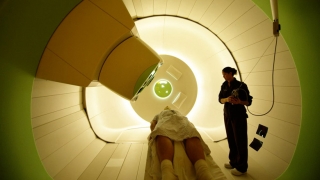
Image courtesy CHOP News
CANCER DIGEST – April 12, 2019 – Proton therapy is both effective in reducing a common childhood tumor while posing little risk to nearby organs, a new study shows.
Researchers at Children’s Hospital of Philadelphia (CHOP) and the Perelman School of Medicine analyzed the largest group of pediatric patients to date with high-risk neuroblastoma treated with proton therapy.
Neuroblastoma is a cancer of immature nerve cells found most commonly in the adrenal glands. The study is published online in the International Journal of Radiation Oncology.
 |
| Image courtesy CHOP News |
Researchers at Children’s Hospital of Philadelphia (CHOP) and the Perelman School of Medicine analyzed the largest group of pediatric patients to date with high-risk neuroblastoma treated with proton therapy.
Neuroblastoma is a cancer of immature nerve cells found most commonly in the adrenal glands. The study is published online in the International Journal of Radiation Oncology.
Saturday, February 16, 2019
Breath test for cancer gets underway in the UK

Photo credit: Owlstone Medical
CANCER DIGEST – Feb. 16, 2019 – Researchers in the United Kingdom have launched a clinical trial that will test a breath analyzer to see if it might be useful in detecting cancer.
Led by Rebecca Fitzgerald, a researcher at the MRC Cancer Center at Cambridge University designed the study that aims to make a simple breath test that can identify patients with an early cancer.
 |
| Photo credit: Owlstone Medical |
Led by Rebecca Fitzgerald, a researcher at the MRC Cancer Center at Cambridge University designed the study that aims to make a simple breath test that can identify patients with an early cancer.
Saturday, January 26, 2019
Older women who often eat fried food have higher risk of dying

Image by [CC BY-SA 3.0], from Wikimedia Commons
CANCER DIGEST – Jan. 26, 2019 – Put down that bucket of fried chicken! A new study of postmenopausal women has found that regularly eating fried food is linked with a higher risk of death from any cause, and heart-related death in particular.
The study published in theBritish Medical Journal (BMJ) this week used a questionnaire to assess the diets of 106,966 women aged 50-79.
 |
| Image by [CC BY-SA 3.0], from Wikimedia Commons |
CANCER DIGEST – Jan. 26, 2019 – Put down that bucket of fried chicken! A new study of postmenopausal women has found that regularly eating fried food is linked with a higher risk of death from any cause, and heart-related death in particular.
The study published in theBritish Medical Journal (BMJ) this week used a questionnaire to assess the diets of 106,966 women aged 50-79.
The study published in theBritish Medical Journal (BMJ) this week used a questionnaire to assess the diets of 106,966 women aged 50-79.
Monday, December 31, 2018
States vary widely in obesity-related cancers
Obesity-related cancer varies widely by state with the highest rate of 8.3 percent in the District of Columbia and the lowest rate of 5.9 percent in Hawaii according to a new American Cancer Society study.
Published in Dec. 27, 2018 JAMA Oncology, researchers led by Farhad Islami, MD, PhD, scientific director for Surveillance Research looked at cancer attributed to excess body weight among adults aged 30 and over between 2011 and 2015 in all 50 states and D.C.
Obesity-related cancer varies widely by state with the highest rate of 8.3 percent in the District of Columbia and the lowest rate of 5.9 percent in Hawaii according to a new American Cancer Society study.
Published in Dec. 27, 2018 JAMA Oncology, researchers led by Farhad Islami, MD, PhD, scientific director for Surveillance Research looked at cancer attributed to excess body weight among adults aged 30 and over between 2011 and 2015 in all 50 states and D.C.
Published in Dec. 27, 2018 JAMA Oncology, researchers led by Farhad Islami, MD, PhD, scientific director for Surveillance Research looked at cancer attributed to excess body weight among adults aged 30 and over between 2011 and 2015 in all 50 states and D.C.
Saturday, December 1, 2018
New approach to a blood test for cancer
CANCER DIGEST – Dec. 1, 2018 – By looking at changes in the product of genes rather than changes in the gene itself researchers in Toronto, Canada have developed a test for cancer that one day might allow your doctor to tell not only whether you have cancer, but what type of cancer you have from a blood sample.
The research published in the journal Nature holds promise of being able to find cancer earlier when it is more easily treated and long before symptoms ever appear.
CANCER DIGEST – Dec. 1, 2018 – By looking at changes in the product of genes rather than changes in the gene itself researchers in Toronto, Canada have developed a test for cancer that one day might allow your doctor to tell not only whether you have cancer, but what type of cancer you have from a blood sample.
The research published in the journal Nature holds promise of being able to find cancer earlier when it is more easily treated and long before symptoms ever appear.
Saturday, November 17, 2018
Loneliness boosts risk of heart disease and cancer
CANCER DIGEST – Nov. 17, 2018 – Joining a book club or bowling league, playing cards with friends or getting involved in a community club is good for you and could reduce your risk of dying from heart disease or cancer. That’s the finding of the Cancer Prevention Study - II that followed more than 580,000 people for 30 years.
The study led by the American Cancer Society’s Kassandra Alcaraz, PhD, MPH, evaluated whether associations of social isolation with all causes of cardiovascular disease and cancer death differed by race and sex. The study appears in the Oct. 2018 issue of the American Journal of Epidemiology.
CANCER DIGEST – Nov. 17, 2018 – Joining a book club or bowling league, playing cards with friends or getting involved in a community club is good for you and could reduce your risk of dying from heart disease or cancer. That’s the finding of the Cancer Prevention Study - II that followed more than 580,000 people for 30 years.
The study led by the American Cancer Society’s Kassandra Alcaraz, PhD, MPH, evaluated whether associations of social isolation with all causes of cardiovascular disease and cancer death differed by race and sex. The study appears in the Oct. 2018 issue of the American Journal of Epidemiology.
The study led by the American Cancer Society’s Kassandra Alcaraz, PhD, MPH, evaluated whether associations of social isolation with all causes of cardiovascular disease and cancer death differed by race and sex. The study appears in the Oct. 2018 issue of the American Journal of Epidemiology.
Saturday, September 15, 2018
Anti-inflammatory diet linked to lower risk of cancer and cardiovascular diseases
CANCER DIGEST – Sept. 15, 2018 – Adhering to an anti-inflammatory diet was associated with lower risk of dying from cancer as well as cardiovascular causes, according to a new study in the Sept. 2018 Journal of Internal Medicine.
The results showed that the more closely the participants followed an anti-inflammatory diet the lower their risk of dying form cancer or cardiovascular causes.
“Our dose-response analysis showed that even partial adherence to the anti-inflammatory diet may provide a health benefit,” said lead author Dr. Joanna Kaluza, an associate professor at the Warsaw University of Life Sciences, in Poland.
CANCER DIGEST – Sept. 15, 2018 – Adhering to an anti-inflammatory diet was associated with lower risk of dying from cancer as well as cardiovascular causes, according to a new study in the Sept. 2018 Journal of Internal Medicine.
The results showed that the more closely the participants followed an anti-inflammatory diet the lower their risk of dying form cancer or cardiovascular causes.
“Our dose-response analysis showed that even partial adherence to the anti-inflammatory diet may provide a health benefit,” said lead author Dr. Joanna Kaluza, an associate professor at the Warsaw University of Life Sciences, in Poland.
The results showed that the more closely the participants followed an anti-inflammatory diet the lower their risk of dying form cancer or cardiovascular causes.
“Our dose-response analysis showed that even partial adherence to the anti-inflammatory diet may provide a health benefit,” said lead author Dr. Joanna Kaluza, an associate professor at the Warsaw University of Life Sciences, in Poland.
Saturday, August 4, 2018
Healthy diet cuts cancer risk
CANCER DIGEST – Aug. 4, 2018 – A diet that encourages both healthy eating and physical activity and discourages alcohol consumption was associated with a reduced overall cancer risk, as well as lower breast, prostate, and colorectal cancer risks.
The World Cancer Research Fund/American Institute for Cancer Research (WCRF/AICR) estimated that in developed countries, around 35 percent of breast cancers and 45 percent of colorectal cancers could be avoided by better adherence to nutritional recommendations.
Many organizations have issued dietary recommendations, but this study evaluated three previously validated nutritional recommendations: The World Cancer Research Fund/American Institute for Cancer Research
CANCER DIGEST – Aug. 4, 2018 – A diet that encourages both healthy eating and physical activity and discourages alcohol consumption was associated with a reduced overall cancer risk, as well as lower breast, prostate, and colorectal cancer risks.
The World Cancer Research Fund/American Institute for Cancer Research (WCRF/AICR) estimated that in developed countries, around 35 percent of breast cancers and 45 percent of colorectal cancers could be avoided by better adherence to nutritional recommendations.
Many organizations have issued dietary recommendations, but this study evaluated three previously validated nutritional recommendations: The World Cancer Research Fund/American Institute for Cancer Research
The World Cancer Research Fund/American Institute for Cancer Research (WCRF/AICR) estimated that in developed countries, around 35 percent of breast cancers and 45 percent of colorectal cancers could be avoided by better adherence to nutritional recommendations.
Many organizations have issued dietary recommendations, but this study evaluated three previously validated nutritional recommendations: The World Cancer Research Fund/American Institute for Cancer Research
Saturday, July 21, 2018
Diabetes increases risk of cancer and even more so for women
CANCER DIGEST – July 21, 2018 – A new population study involving 20 million people has found that having diabetes, either type 1 or 2, increases the risk of cancer compared to people without diabetes.
The researchers, led by Dr. Toshiaki Ohkuma, at the George Institute for Global Health at Oxford University analyzed data from 47 studies from the USA, Japan,
CANCER DIGEST – July 21, 2018 – A new population study involving 20 million people has found that having diabetes, either type 1 or 2, increases the risk of cancer compared to people without diabetes.
The researchers, led by Dr. Toshiaki Ohkuma, at the George Institute for Global Health at Oxford University analyzed data from 47 studies from the USA, Japan,
The researchers, led by Dr. Toshiaki Ohkuma, at the George Institute for Global Health at Oxford University analyzed data from 47 studies from the USA, Japan,
Saturday, June 30, 2018
Poliovirus significantly boosts survival in deadly brain cancer

Image courtesy Duke Health
CANCER DIGEST – June 30, 2018 – Using a genetically modified poliovirus, researchers at Duke Cancer Institute have significantly improved long-term survival for patients with recurrent glioblastoma, a deadly form of brain cancer.
The early stage clinical trial results of the poliovirus therapy were presented June 26 at the 22nd International Conference on Brain Tumor Research and Therapy in Norway and simultaneously published in June 26, 2018 The New England Journal of Medicine.
 |
| Image courtesy Duke Health |
The early stage clinical trial results of the poliovirus therapy were presented June 26 at the 22nd International Conference on Brain Tumor Research and Therapy in Norway and simultaneously published in June 26, 2018 The New England Journal of Medicine.
Saturday, March 17, 2018
Medicare will cover genetic tests for cancer patients
CANCER DIGEST – Mar. 17, 2018 – The Centers for Medicare & Medicaid Services (CMS) announced on Mar. 16 that Medicare will cover genetic testing needed to match cancer patients with targeted immunotherapies. Specifically Medicare will cover Next Generation Sequencing (NGS) for patients with advanced cancer that has spread or has relapsed or fails to respond to other therapies.
CANCER DIGEST – Mar. 17, 2018 – The Centers for Medicare & Medicaid Services (CMS) announced on Mar. 16 that Medicare will cover genetic testing needed to match cancer patients with targeted immunotherapies. Specifically Medicare will cover Next Generation Sequencing (NGS) for patients with advanced cancer that has spread or has relapsed or fails to respond to other therapies.
Friday, January 19, 2018
Another blood test for cancer shows promise

Image courtesy Johns Hopkins – Credit: Elizabeth
Cook and Kaitlin Lindsay
CANCER
DIGEST – Jan. 19, 2018 – A team of researchers have developed another
blood test for cancer, which if confirmed in clinical trials, could
identify eight cancer types from a single blood draw.
The team at Johns Hopkins University of School of Medicine published its findings in the Jan. 18, 2018 journal Science.
The test, called CancerSEEK simultaneously evaluates the levels of
eight cancer proteins and the presence of cancer gene mutations from
circulating DNA in the blood. Five of the cancers currently have no
screening test.
 |
| Image courtesy Johns Hopkins – Credit: Elizabeth Cook and Kaitlin Lindsay |
The team at Johns Hopkins University of School of Medicine published its findings in the Jan. 18, 2018 journal Science. The test, called CancerSEEK simultaneously evaluates the levels of eight cancer proteins and the presence of cancer gene mutations from circulating DNA in the blood. Five of the cancers currently have no screening test.
Saturday, December 16, 2017
New drug shows promise in a variety cancers
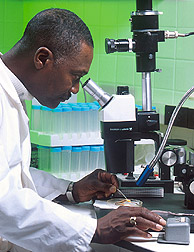
Stock photo courtesy Wikipedia
CANCER DIGEST – Dec. 16, 2016 – A new drug that targets the protein made by a mutation of a gene common to many cancers has shown activity against a variety of tumor types, according to researchers.
The study presents the early results of an first phase clinical trial that aims to establish safe and effective doses of the drug, called ulixertinib. Such phase I clinical trials test a range of doses to determine first whether the drug can slow or halt the progress of the cancer and determine the side effects as well. The study results appear in Cancer Discovery, the journal of the American Association of Cancer Research.
 |
| Stock photo courtesy Wikipedia |
The study presents the early results of an first phase clinical trial that aims to establish safe and effective doses of the drug, called ulixertinib. Such phase I clinical trials test a range of doses to determine first whether the drug can slow or halt the progress of the cancer and determine the side effects as well. The study results appear in Cancer Discovery, the journal of the American Association of Cancer Research.
Sunday, November 26, 2017
When is the cost of treatment too high?
CANCER DIGEST – Nov. 24, 2017 – Unfortunately, that’s a question that too many cancer patients face every day. As the cost of newer and sometimes more effective treatments soar into the thousands of dollars per month more and more patients are making choices that reduce the effectiveness of those treatments.
In a recent National Cancer Opinion Survey, by the American Society of Clinical Oncology (ASCO), 27 percent of Americans who have cancer or have a family member with cancer have taken steps to lower their treatment costs. Such steps include skipping appointments, refusing treatment, not filling prescriptions, skipping doses or splitting doses, all are actions that can reduce the effectiveness of treatment.
CANCER DIGEST – Nov. 24, 2017 – Unfortunately, that’s a question that too many cancer patients face every day. As the cost of newer and sometimes more effective treatments soar into the thousands of dollars per month more and more patients are making choices that reduce the effectiveness of those treatments.
In a recent National Cancer Opinion Survey, by the American Society of Clinical Oncology (ASCO), 27 percent of Americans who have cancer or have a family member with cancer have taken steps to lower their treatment costs. Such steps include skipping appointments, refusing treatment, not filling prescriptions, skipping doses or splitting doses, all are actions that can reduce the effectiveness of treatment.
In a recent National Cancer Opinion Survey, by the American Society of Clinical Oncology (ASCO), 27 percent of Americans who have cancer or have a family member with cancer have taken steps to lower their treatment costs. Such steps include skipping appointments, refusing treatment, not filling prescriptions, skipping doses or splitting doses, all are actions that can reduce the effectiveness of treatment.
Wednesday, October 4, 2017
Do expensive new cancer drugs really improve survival?
 CANCER DIGEST – Oct. 4, 2017 – That’s the question a group of British researchers at King’s College in London asked for a study published today in the British Medical Journal (BMJ).
CANCER DIGEST – Oct. 4, 2017 – That’s the question a group of British researchers at King’s College in London asked for a study published today in the British Medical Journal (BMJ).
The study looked at the clinical data for cancer drugs approved by the European Medicines Agency, the European version of the US FDA, between 2009 and 2013. They found that of the 68 drugs approved during that period, 39 (57%) were approved on the basis of surrogate endpoints. This is essentially an endpoint that is substituted for an actual outcome. This is done to speed approvals of certain drugs.
 CANCER DIGEST – Oct. 4, 2017 – That’s the question a group of British researchers at King’s College in London asked for a study published today in the British Medical Journal (BMJ).
CANCER DIGEST – Oct. 4, 2017 – That’s the question a group of British researchers at King’s College in London asked for a study published today in the British Medical Journal (BMJ).The study looked at the clinical data for cancer drugs approved by the European Medicines Agency, the European version of the US FDA, between 2009 and 2013. They found that of the 68 drugs approved during that period, 39 (57%) were approved on the basis of surrogate endpoints. This is essentially an endpoint that is substituted for an actual outcome. This is done to speed approvals of certain drugs.
Saturday, September 23, 2017
Nearly all Americans take at least one step to prevent cancer
CANCER DIGEST – Sept. 23, 2017 – Cancer prevention, an idea the American Cancer Society and the National Cancer Institute have been preaching for decades seems to have taken hold, according to a new survey by the Mayo Clinic.
The annual Mayo Clinic National Health Checkup survey released last week shows that 95 percent of respondents take at least one preventive measure to avoid cancer. Started last year, health checkup survey aims to provide a quick pulse on consumer health opinions and behaviors at multiple times throughout the year.
CANCER DIGEST – Sept. 23, 2017 – Cancer prevention, an idea the American Cancer Society and the National Cancer Institute have been preaching for decades seems to have taken hold, according to a new survey by the Mayo Clinic.
The annual Mayo Clinic National Health Checkup survey released last week shows that 95 percent of respondents take at least one preventive measure to avoid cancer. Started last year, health checkup survey aims to provide a quick pulse on consumer health opinions and behaviors at multiple times throughout the year.
The annual Mayo Clinic National Health Checkup survey released last week shows that 95 percent of respondents take at least one preventive measure to avoid cancer. Started last year, health checkup survey aims to provide a quick pulse on consumer health opinions and behaviors at multiple times throughout the year.
Saturday, September 9, 2017
Zika virus kills brain cancer, may be potential treatment
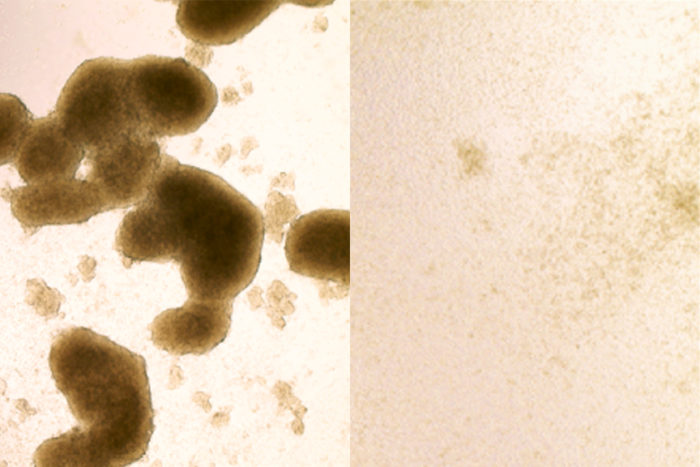
Brain cancer stem cells (left) are killed by Zika
virus infection (right). – photo courtesy
Washington University
CANCER DIGEST – Sept. 9, 2017 – The Zika virus kills brain cancer stem cells and may be an effective treatment for glioblastoma, a deadly form of brain cancer, say researchers from Washington University and the University of San Diego School of Medicine.
The findings, published Sept. 5 in The Journal of Experimental Medicineshowed laboratory results of glioblastoma tumors removed from patients that the researchers infected with two strains of Zika virus.
 |
| Brain cancer stem cells (left) are killed by Zika virus infection (right). – photo courtesy Washington University |
The findings, published Sept. 5 in The Journal of Experimental Medicineshowed laboratory results of glioblastoma tumors removed from patients that the researchers infected with two strains of Zika virus.
Saturday, August 19, 2017
Researcher getting closer to liquid biopsy for cancer
Scientists have developed a blood test that identifies tiny bits of cancer-specific DNA in blood that accurately identified more than half of 138 people with relatively early-stage colorectal, breast, lung and ovarian cancers.
The research performed on blood and tumor tissue samples from 200 people with all stages of cancer in the U.S., Denmark and the Netherlands, appears in the Aug. 16 issue of Science Translational Medicine.
Scientists have developed a blood test that identifies tiny bits of cancer-specific DNA in blood that accurately identified more than half of 138 people with relatively early-stage colorectal, breast, lung and ovarian cancers.
The research performed on blood and tumor tissue samples from 200 people with all stages of cancer in the U.S., Denmark and the Netherlands, appears in the Aug. 16 issue of Science Translational Medicine.
The research performed on blood and tumor tissue samples from 200 people with all stages of cancer in the U.S., Denmark and the Netherlands, appears in the Aug. 16 issue of Science Translational Medicine.
Saturday, July 22, 2017
Can CAR T-cells overcome glioblastmas?
CANCER DIGEST – July 21, 2017 – Glioblastoma, the aggressive and deadly form of brain cancer Senator John McCain was diagnosed with this past week, has been shown to be resistant to most current treatments.
In a study also reported this week in the journal Science Translational Medicine researchers at the Perelman School of Medicine at the University of Pennsylvania used T cells genetically modified to kill cancerous glial cells called glioblastoma.
CANCER DIGEST – July 21, 2017 – Glioblastoma, the aggressive and deadly form of brain cancer Senator John McCain was diagnosed with this past week, has been shown to be resistant to most current treatments.
In a study also reported this week in the journal Science Translational Medicine researchers at the Perelman School of Medicine at the University of Pennsylvania used T cells genetically modified to kill cancerous glial cells called glioblastoma.
In a study also reported this week in the journal Science Translational Medicine researchers at the Perelman School of Medicine at the University of Pennsylvania used T cells genetically modified to kill cancerous glial cells called glioblastoma.
Tuesday, July 11, 2017
Cup 'o Joe may cut risk of death
CANCER DIGEST – July 11, 2017 – The evidence for the health benefits of coffee continue to grow, now for the first time a study shows a survival benefit for coffee drinkers.
The study, which was published in the July 11 issue of Annals of Internal Medicine, used data from the Multiethnic Cohort Study, a collaborative effort between the University of Hawaii Cancer Center and the Keck School of Medicine. The ongoing study begun in 1993 has more than 215,000 participants and bills itself as the most ethnically diverse study examining lifestyle risk factors that may lead to cancer.
CANCER DIGEST – July 11, 2017 – The evidence for the health benefits of coffee continue to grow, now for the first time a study shows a survival benefit for coffee drinkers.
The study, which was published in the July 11 issue of Annals of Internal Medicine, used data from the Multiethnic Cohort Study, a collaborative effort between the University of Hawaii Cancer Center and the Keck School of Medicine. The ongoing study begun in 1993 has more than 215,000 participants and bills itself as the most ethnically diverse study examining lifestyle risk factors that may lead to cancer.
The study, which was published in the July 11 issue of Annals of Internal Medicine, used data from the Multiethnic Cohort Study, a collaborative effort between the University of Hawaii Cancer Center and the Keck School of Medicine. The ongoing study begun in 1993 has more than 215,000 participants and bills itself as the most ethnically diverse study examining lifestyle risk factors that may lead to cancer.
Saturday, June 17, 2017
Drug Improves overall survival in older patients with thyroid cancer

Illustration courtesy of Cancer Research UK
CANCER DIGEST – June 17, 2017 – A drug used to treat thyroid cancer that is resistant to standard therapy has been shown to increase survival in older patients, according to researchers.
Most cases of differentiated thyroid cancer (DTC) are successfully treated with radioiodine therapy. The thyroid absorbs nearly all of the iodine in the human body, consequently, patients with DTC are given radioactive iodine, which concentrates in thyroid cancer cells, killing them with little effect on the rest of the body. The treatment can be curative, but about 15 percent of DTC patients have cancers that are resistant to the therapy.
 |
| Illustration courtesy of Cancer Research UK |
Most cases of differentiated thyroid cancer (DTC) are successfully treated with radioiodine therapy. The thyroid absorbs nearly all of the iodine in the human body, consequently, patients with DTC are given radioactive iodine, which concentrates in thyroid cancer cells, killing them with little effect on the rest of the body. The treatment can be curative, but about 15 percent of DTC patients have cancers that are resistant to the therapy.
Wednesday, March 29, 2017
Computer analysis detects cancer from blood
CANCER DIGEST – March 29, 2017 – Researchers have developed a computer program that can detect cancer and identify where in the body the cancer is located, from a patient's blood sample.
The program works by looking for specific molecular patterns in cancer DNA that is free flowing in the patients' blood and comparing the patterns against a database of DNA associated with different types of cancer. DNA from tumor cells is known to end up in the bloodstream in the earliest stages of cancer and offers a unique target for early detection of the disease.Continue reading
Saturday, January 14, 2017Malaria drug may be cancer treatment

A new study by University of Kentucky Markey Cancer
Center researchers shows that chloroquine – a drug
currently used to treat malaria – may be useful in
treating patients with metastatic cancers
CANCER DIGEST – Jan. 14, 2017 – A drug used to treat malaria may be useful in halting the spread of cancer cells, researchers say.
In a study published in the January 2017 Cell Reports, researchers at the University of Kentucky Markey Cancer center showed in both mouse models and in cancer patients in a clinical trial that the drug chloroquine triggers the production of a protein, called Par-4, a protein that plays a key role in tumor cell death and metastasis.
 |
| A new study by University of Kentucky Markey Cancer Center researchers shows that chloroquine – a drug currently used to treat malaria – may be useful in treating patients with metastatic cancers |
In a study published in the January 2017 Cell Reports, researchers at the University of Kentucky Markey Cancer center showed in both mouse models and in cancer patients in a clinical trial that the drug chloroquine triggers the production of a protein, called Par-4, a protein that plays a key role in tumor cell death and metastasis.
Sunday, December 11, 2016
First viral treatment for brain cancer

Beth Rogers is flanked by her daughter Amanda Keith
and J.D. Day, M.D., who performed her surgery.
CANCER DIGEST – Dec. 11, 2016 – It has been two months since an Hazen, Arkansas woman became the first person in the US to undergo a new viral treatment for glioblastoma, a particularly deadly form of brain cancer, and so far, it is so good.
“That is so neat,” Beth Rogers said in a press release of being treated so close to home. “I’m just hopeful through this trial that I’m going to help them find better treatment for glioblastoma because we’ve got to do something. And I’m proud that it’s being done in Arkansas at UAMS.”Continue reading
 |
|
Beth Rogers is flanked by her daughter Amanda Keith
and J.D. Day, M.D., who performed her surgery.
|
CANCER DIGEST – Dec. 11, 2016 – It has been two months since an Hazen, Arkansas woman became the first person in the US to undergo a new viral treatment for glioblastoma, a particularly deadly form of brain cancer, and so far, it is so good.
“That is so neat,” Beth Rogers said in a press release of being treated so close to home. “I’m just hopeful through this trial that I’m going to help them find better treatment for glioblastoma because we’ve got to do something. And I’m proud that it’s being done in Arkansas at UAMS.”Continue reading
“That is so neat,” Beth Rogers said in a press release of being treated so close to home. “I’m just hopeful through this trial that I’m going to help them find better treatment for glioblastoma because we’ve got to do something. And I’m proud that it’s being done in Arkansas at UAMS.”Continue reading
Saturday, August 27, 2016
New test may identify primary tumor

Epigenetic tests, such as the Epicup
may be used to identify primary
tumors.
CANCER DIGEST -- Aug. 26, 2016 -- In an article published in The Lancet Oncology, researchers at the Bellvitge Biomedical Research Institute (IDIBELL), show that a newly-developed test, called an epigenetic test, can determine the tissue type of the primary tumor, which would allow doctors to develop more specific treatments for it.
In patients with cancer, initial diagnosis most often includes the detection of the primary or original tumor and the presence or absence of metastasis, or the spread of cancer cells from the original tumor that are growing in other tissues.
| Epigenetic tests, such as the Epicup may be used to identify primary tumors. |
In patients with cancer, initial diagnosis most often includes the detection of the primary or original tumor and the presence or absence of metastasis, or the spread of cancer cells from the original tumor that are growing in other tissues.
Tuesday, June 7, 2016
Universal cancer vaccine can attack any cancer
CANCER DIGEST – June 7, 2016– German scientists have reported inching closer to a long sought universal vaccine that will attack cancer, any cancer.
Research groups around the world for decades have been pursuing the vaccine approach, which will rev up a cancer patient’s immune system to recognize and eliminate cancer cells.
0 commentsWednesday, May 18, 2016
Being physically active may lower your cancer risk
Higher levels of leisure-time physical activity may lower your risk for 13 types of cancers, according to a new study published online by JAMA Internal Medicine.
Steven C. Moore, Ph.D., M.P.H., of the National Cancer Institute, Bethesda, Md., and coauthors pooled data from 12 U.S. and European cohorts (groups of study participants) with self-reported physical activity (1987-2004). They analyzed associations of physical activity with the incidence of 26 kinds of cancer.
Higher levels of leisure-time physical activity may lower your risk for 13 types of cancers, according to a new study published online by JAMA Internal Medicine.
Steven C. Moore, Ph.D., M.P.H., of the National Cancer Institute, Bethesda, Md., and coauthors pooled data from 12 U.S. and European cohorts (groups of study participants) with self-reported physical activity (1987-2004). They analyzed associations of physical activity with the incidence of 26 kinds of cancer.
Saturday, April 9, 2016
Higher levels of vitamin D leads to lower cancer risk
CANCER DIGEST – April 7, 2016 – Researchers at University of California, San Diego School of Medicine report that the higher the levels of a marker for vitamin D in the blood, the lower the risk of cancer. The findings are published in the April 6, online issue of the journal PLOS ONE.
The new study aimed to determine what level of 25-hydroxyvitamin D in the blood was required to effectively reduce cancer risk. 25-hydroxyvitamin D is the main form of vitamin D in the blood. Vitamin D has been linked to lower risk of cancer since the 1980s, but what the level needs to be to provide the protection has been controversial.
CANCER DIGEST – April 7, 2016 – Researchers at University of California, San Diego School of Medicine report that the higher the levels of a marker for vitamin D in the blood, the lower the risk of cancer. The findings are published in the April 6, online issue of the journal PLOS ONE.
The new study aimed to determine what level of 25-hydroxyvitamin D in the blood was required to effectively reduce cancer risk. 25-hydroxyvitamin D is the main form of vitamin D in the blood. Vitamin D has been linked to lower risk of cancer since the 1980s, but what the level needs to be to provide the protection has been controversial.
Wednesday, February 10, 2016
Cancer drug receives FDA Priority Review for kidney cancer
CANCER DIGEST – Feb. 10, 2016 – Patients with a type of kidney cancer that has spread to other parts of the body despite surgery and chemotherapy may soon have a new treatment option.
The FDA granted Priority Review for a drug called lenvatinib (Lenvima®) for treatment in combination with the drug everolimus for kidney cancer that has failed to respond to surgery and prior chemotherapy.
CANCER DIGEST – Feb. 10, 2016 – Patients with a type of kidney cancer that has spread to other parts of the body despite surgery and chemotherapy may soon have a new treatment option.
The FDA granted Priority Review for a drug called lenvatinib (Lenvima®) for treatment in combination with the drug everolimus for kidney cancer that has failed to respond to surgery and prior chemotherapy.
Friday, November 13, 2015
Blood test could change cancer diagnosis
CANCER DIGEST – Nov. 13, 2015 – A new test of blood platelets can be used to detect, classify and pinpoint the location of cancer by analyzing as little as one drop of blood.
Using this new method, researchers have been able to identify cancer with 96 percent accuracy, according to a study at Umeå University in Sweden recently published in the journal Cancer Cell.
CANCER DIGEST – Nov. 13, 2015 – A new test of blood platelets can be used to detect, classify and pinpoint the location of cancer by analyzing as little as one drop of blood.
Using this new method, researchers have been able to identify cancer with 96 percent accuracy, according to a study at Umeå University in Sweden recently published in the journal Cancer Cell.
Monday, July 13, 2015
Blood test for cancer? Maybe
 |
| Dr. Diana Bianchi |
CANCER DIGEST – July 13, 2015 – Genetic tests for abnormal chromosomes associated with Downs syndrome and other defects in the fetus, may also detect underlying conditions in the mother, including cancer according to a new study.
The study reports on the accidental findings from a case series of eight women who had abnormal noninvasive prenatal testing results. While their fetuses had normal chromosomes, later genetic analysis showed that the abnormal findings were due to a variety of undiagnosed cancers in the mothers.
Labels: blood test, cancer, prenatal screening
Vitamin D and weight loss linked to reduced inflammation

Lead author Catherine
Duggan, Ph.D
CANCER DIGEST – June 24, 2015 – For the first time, researchers have found that weight loss, in combination with taking vitamin D, has a greater effect on reducing chronic inflammation than weight loss alone.
Chronic inflammation is known to contribute to the development and progression of several diseases, including some cancers. Led by Catherine Duggan, Ph.D., researchers in the Public Health Sciences Division at Fred Hutchinson Cancer Research Center, Seattle, WA published their findings online ahead of the July issue of the journal Cancer Prevention Research.
Lead author Catherine
Duggan, Ph.D |
CANCER DIGEST – June 24, 2015 – For the first time, researchers have found that weight loss, in combination with taking vitamin D, has a greater effect on reducing chronic inflammation than weight loss alone.
Chronic inflammation is known to contribute to the development and progression of several diseases, including some cancers. Led by Catherine Duggan, Ph.D., researchers in the Public Health Sciences Division at Fred Hutchinson Cancer Research Center, Seattle, WA published their findings online ahead of the July issue of the journal Cancer Prevention Research.
Tuesday, June 23, 2015
Cancer doctors publish tool to help compare treatment values
ALEXANDRIA, Va. – The American Society of Clinical Oncology (ASCO) today published an initial version of what it hopes to develop into a standardized tool to help patients and their doctors assess the value of cancer treatment options based on clinical benefit, side effects, and for the first time cost.
While cancer patients have long been confronted with discussions of complicated treatment options with varying degrees of effectiveness and side effects. Seldom is
ALEXANDRIA, Va. – The American Society of Clinical Oncology (ASCO) today published an initial version of what it hopes to develop into a standardized tool to help patients and their doctors assess the value of cancer treatment options based on clinical benefit, side effects, and for the first time cost.
While cancer patients have long been confronted with discussions of complicated treatment options with varying degrees of effectiveness and side effects. Seldom is
Friday, May 22, 2015
Imaging technique identifies early metastasis in lymph nodes
CANCER DIGEST – May 22, 2015 – Researchers at the National Institute of Biomedical Imaging and Engineering have developed a highly sensitive and accurate imaging technique for visualizing cancer cells in the lymph nodes.
The non-invasive screening method could one day reduce the need for the current practice of surgically removing lymph nodes to determine whether metastatic cancer cells have invaded the lymph nodes.
The new imaging technique – so far tested only in mice – offers a rapid and effective tool to non-invasively identify very small numbers of these cells, known as micrometastases, thus detecting cancer’s spread at its earliest stages, which is critical for timely treatment.
CANCER DIGEST – May 22, 2015 – Researchers at the National Institute of Biomedical Imaging and Engineering have developed a highly sensitive and accurate imaging technique for visualizing cancer cells in the lymph nodes.
The non-invasive screening method could one day reduce the need for the current practice of surgically removing lymph nodes to determine whether metastatic cancer cells have invaded the lymph nodes.
The new imaging technique – so far tested only in mice – offers a rapid and effective tool to non-invasively identify very small numbers of these cells, known as micrometastases, thus detecting cancer’s spread at its earliest stages, which is critical for timely treatment.
Friday, May 8, 2015
Compliance and follow-up boosts survival in head and neck cancer
CANCER DIGEST – May 8, 2015 – Treatment compliance and post-treatment follow up care makes a big difference in five-year survival of people with a form of head and neck cancer, a new study shows.
Researchers led by Michael W. Deutschmann, MD of the University of Kansas Medical Center, Kansas City, followed 332 patients for an average of 45 months after treatment for head and neck squamous cell cancer. The five-year survival rate for this cancer is a little above 50 percent.
CANCER DIGEST – May 8, 2015 – Treatment compliance and post-treatment follow up care makes a big difference in five-year survival of people with a form of head and neck cancer, a new study shows.
Researchers led by Michael W. Deutschmann, MD of the University of Kansas Medical Center, Kansas City, followed 332 patients for an average of 45 months after treatment for head and neck squamous cell cancer. The five-year survival rate for this cancer is a little above 50 percent.
Monday, April 13, 2015
HPV vaccine for boys could prevent oral cancer, save money

Imagae: courtesy CDC
CANCER DIGEST – April 13, 2015 – The vaccine that prevents cervical cancer in girls may save healthcare dollars if comprehensive vaccination of boys were implemented to prevent oral cancers in boys.
A new study suggests that vaccinating 12-year-old boys against the humanpapilloma virus (HPV) may be a cost-effective strategy for preventing oropharyngeal squamous cell cancer, a cancer that starts at the back of the throat and mouth, and involves the tonsils and base of the tongue.
| Imagae: courtesy CDC |
CANCER DIGEST – April 13, 2015 – The vaccine that prevents cervical cancer in girls may save healthcare dollars if comprehensive vaccination of boys were implemented to prevent oral cancers in boys.
A new study suggests that vaccinating 12-year-old boys against the humanpapilloma virus (HPV) may be a cost-effective strategy for preventing oropharyngeal squamous cell cancer, a cancer that starts at the back of the throat and mouth, and involves the tonsils and base of the tongue.
Thursday, December 18, 2014
Words of war and cancer
CANCER DIGEST – Dec. 18, 2014 – War and enemy metaphors are the most common metaphors found in new reports about cancer, and they pervade public discussion about the disease. The entire effort to find a cure for cancer, in fact, has been called a “war on cancer,” since President Nixon signed the National Cancer Act in 1971.
But are such metaphors actually keeping us from taking the steps that can prevent more than half of all cancers?
CANCER DIGEST – Dec. 18, 2014 – War and enemy metaphors are the most common metaphors found in new reports about cancer, and they pervade public discussion about the disease. The entire effort to find a cure for cancer, in fact, has been called a “war on cancer,” since President Nixon signed the National Cancer Act in 1971.
But are such metaphors actually keeping us from taking the steps that can prevent more than half of all cancers?
Monday, November 10, 2014
New drug shows promise for people with BRCA1 or 2 cancers
CANCER DIGEST – Nov. 10, 2014 – People with certain cancers that stem from mutations of the BRCA1 or BRCA2 gene may soon have another treatment option to slow the cancer progression.
In an early stage clinical trial of the twice-daily drug olaparib, 26 percent of patients had their tumors shrink or disappear for up to 7 months. The phase II trial was designed to determine whether tumors responded to the drug. Whether the drug significantly increases survival will need to be tested in larger phase III studies.
CANCER DIGEST – Nov. 10, 2014 – People with certain cancers that stem from mutations of the BRCA1 or BRCA2 gene may soon have another treatment option to slow the cancer progression.
In an early stage clinical trial of the twice-daily drug olaparib, 26 percent of patients had their tumors shrink or disappear for up to 7 months. The phase II trial was designed to determine whether tumors responded to the drug. Whether the drug significantly increases survival will need to be tested in larger phase III studies.
Tuesday, October 7, 2014
Increasing tobacco exposure linked to rise in oral cancer virus infection
CANCER DIGEST – Oct. 7, 2014 – People with higher levels of the tobacco-related chemicals in their blood and urine were more likely to have the herpes virus that causes oral cancers, a new study shows.
While previous studies have shown higher risk of oral infection with the HPV16 virus among smokers, this study looked at HPV16 infection among people who have tobacco-linked chemicals in their blood or urine, regardless of how they are exposed to tobacco including second-hand smoke. The new study appears in the Oct. 7 issue ofJAMA.
CANCER DIGEST – Oct. 7, 2014 – People with higher levels of the tobacco-related chemicals in their blood and urine were more likely to have the herpes virus that causes oral cancers, a new study shows.
While previous studies have shown higher risk of oral infection with the HPV16 virus among smokers, this study looked at HPV16 infection among people who have tobacco-linked chemicals in their blood or urine, regardless of how they are exposed to tobacco including second-hand smoke. The new study appears in the Oct. 7 issue ofJAMA.
While previous studies have shown higher risk of oral infection with the HPV16 virus among smokers, this study looked at HPV16 infection among people who have tobacco-linked chemicals in their blood or urine, regardless of how they are exposed to tobacco including second-hand smoke. The new study appears in the Oct. 7 issue ofJAMA.
Monday, September 29, 2014
Combination treatment boosts melanoma treatment

OncoLetter YouTube – Sep 29, 2012
CANCER DIGEST – Sept. 25, 2014 – Patients with advanced stage melanoma had their cancer growth halted for an average of almost 10 months when treated with a combination therapy compared to a little more than 6 months for those treated with a single chemotherapy drug.
 |
| OncoLetter YouTube – Sep 29, 2012 |
Thursday, September 18, 2014
Wild berry extract may boost effect of pancreatic cancer drug
CANCER DIGEST – Sept. 18, 2014 – In a laboratory study, extract of chokeberry (Aronia melanocarpa) appeared to increase the number of cancer cells killed following an application of a common chemotherapy drug used for a number of cancers.
The study used a well-known line of pancreatic cancer cells (AsPC-1) in the laboratory and tested how well the cells grew when treated with either the chemotherapy drug gemcitabine (Gemzar®) or different levels of commercially available chokeberry extract alone, and when treated with a combination of gemcitabine and chokeberry extract.
The researchers at King's College Hospital and the University of Southampton, UK, found that a dose as little as 1 ug/ml (microgram per milliliter) over 48 hours was effective in increasing the cancer cell-killing effectiveness of the gemcitabine. At the same time, the berry extract had no effect on the normal cells lining the blood vessels indicating that, however the extract was spurring cancer cell death, it was not by preventing new blood vessel formation. The researchers published their findings in the online version of the Journal of Clinical Pathology.
"These are very exciting results. The low doses of the extract greatly boosted the effectiveness of gemcitabine when the two were combined,” Lead Researcher Bashir Lwaleed said in press release. “In addition, we found that lower doses of the conventional drug were needed, suggesting either that the compounds work together synergistically, or that the extract exerts a ‘supra-additive’ effect. This could change the way we deal with hard to treat cancers in the future. "
The team believes that clinical trials are now needed to explore the potential of naturally occurring micronutrients in plants, such as those found in chokeberry.
CANCER DIGEST – Sept. 18, 2014 – In a laboratory study, extract of chokeberry (Aronia melanocarpa) appeared to increase the number of cancer cells killed following an application of a common chemotherapy drug used for a number of cancers.
The study used a well-known line of pancreatic cancer cells (AsPC-1) in the laboratory and tested how well the cells grew when treated with either the chemotherapy drug gemcitabine (Gemzar®) or different levels of commercially available chokeberry extract alone, and when treated with a combination of gemcitabine and chokeberry extract.
The researchers at King's College Hospital and the University of Southampton, UK, found that a dose as little as 1 ug/ml (microgram per milliliter) over 48 hours was effective in increasing the cancer cell-killing effectiveness of the gemcitabine. At the same time, the berry extract had no effect on the normal cells lining the blood vessels indicating that, however the extract was spurring cancer cell death, it was not by preventing new blood vessel formation. The researchers published their findings in the online version of the Journal of Clinical Pathology.
"These are very exciting results. The low doses of the extract greatly boosted the effectiveness of gemcitabine when the two were combined,” Lead Researcher Bashir Lwaleed said in press release. “In addition, we found that lower doses of the conventional drug were needed, suggesting either that the compounds work together synergistically, or that the extract exerts a ‘supra-additive’ effect. This could change the way we deal with hard to treat cancers in the future. "
The team believes that clinical trials are now needed to explore the potential of naturally occurring micronutrients in plants, such as those found in chokeberry.
Wednesday, September 17, 2014
Throat cancer patients with HPV may not need neck surgery
CANCER DIGEST – Sept. 17, 2014 – Patients with neck cancer, who are infected with human papillomavirus (HPV), are significantly more likely to have the cancer shrink completely from radiation therapy before neck surgery than those with who had not been infected by the virus.
 Researchers reviewed the medical records from 396 patients whose neck (oropharyngeal) cancer had spread to at least one lymph node. Within 180 days after completing radiation therapy, 146 patients underwent neck surgery. For 99 patients, their records indicated whether or not their tumors had likely been triggered by HPV, the same virus associated with both cervical and head and neck cancer.
Researchers reviewed the medical records from 396 patients whose neck (oropharyngeal) cancer had spread to at least one lymph node. Within 180 days after completing radiation therapy, 146 patients underwent neck surgery. For 99 patients, their records indicated whether or not their tumors had likely been triggered by HPV, the same virus associated with both cervical and head and neck cancer.
People who tested positive for HPV (measured by the presence of a protein called p16) were less likely to have a recurrence of their cancers, regardless of whether or not the tumors had completely disappeared following treatment. After they analyzed all other factors they found that the patients' HPV status was the strongest predictor of whether or not they were alive at the end of the study.
The study was led by Thomas J. Galloway, MD, attending physician and director of clinical research at Fox Chase, who presented the findings today at the American Society for Radiation Oncology's 56th Annual Meeting in San Francisco. He concluded that throat cancer patients who are positive for HPV may safely avoid neck surgery following radiation therapy.
CANCER DIGEST – Sept. 17, 2014 – Patients with neck cancer, who are infected with human papillomavirus (HPV), are significantly more likely to have the cancer shrink completely from radiation therapy before neck surgery than those with who had not been infected by the virus.
 Researchers reviewed the medical records from 396 patients whose neck (oropharyngeal) cancer had spread to at least one lymph node. Within 180 days after completing radiation therapy, 146 patients underwent neck surgery. For 99 patients, their records indicated whether or not their tumors had likely been triggered by HPV, the same virus associated with both cervical and head and neck cancer.
Researchers reviewed the medical records from 396 patients whose neck (oropharyngeal) cancer had spread to at least one lymph node. Within 180 days after completing radiation therapy, 146 patients underwent neck surgery. For 99 patients, their records indicated whether or not their tumors had likely been triggered by HPV, the same virus associated with both cervical and head and neck cancer.
People who tested positive for HPV (measured by the presence of a protein called p16) were less likely to have a recurrence of their cancers, regardless of whether or not the tumors had completely disappeared following treatment. After they analyzed all other factors they found that the patients' HPV status was the strongest predictor of whether or not they were alive at the end of the study.
The study was led by Thomas J. Galloway, MD, attending physician and director of clinical research at Fox Chase, who presented the findings today at the American Society for Radiation Oncology's 56th Annual Meeting in San Francisco. He concluded that throat cancer patients who are positive for HPV may safely avoid neck surgery following radiation therapy.
Read more …
Thursday, September 4, 2014
FDA grants accelerated approval to Keytruda for melanoma
CANCER DIGEST – Sept. 4, 2014 – The FDA granted fast-track approval to the first of a new class of drugs that promise to hold the key to turning off cancer cells’ ability to evade the body’s immune system.
The drug, pembrolizumab, was approved for treatment of advanced melanoma that is no longer responding to other drugs. It works by blocking a protein called PD-1, which cancer cells produce to restrict the immune system’s ability to attack melanoma cells.
Marketed under the brand name Keytruda by Merck, it is intended for use following treatment with ipillmumab, an immunotherapy drug that acts on a gene mutation, BRAF V600, which triggers signals inside cells to rev up growth.
The FDA granted Keytruda breakthrough-therapy-status because Merck has demonstrated through preliminary clinical evidence that the drug may offer a substantial improvement over available therapies. It allows patients access to the drug while the company conducts clinical trials to confirm the early results.
Keytruda showed its potential effectiveness in 173 clinical trial participants with advanced melanoma whose disease progressed after other treatments failed to halt it. All participants treated with either of two doses of Keytruda responded. In the half of the participants who received Keytruda at the recommended dose of 2 mg/kg, approximately 24 percent had their tumors shrink. This effect lasted at least one to almost nine months and continued beyond nine months in most patients. A similar percentage of patients had their tumors shrink at the 10 mg/kg dose.
The most common side effects of Keytruda were fatigue, cough, nausea, itchy skin (pruritus), rash, decreased appetite, constipation, joint pain (arthralgia) and diarrhea, and has the potential to damage the lungs, colons and hormone-producing glands such as the liver, but this did not occur often.
CANCER DIGEST – Sept. 4, 2014 – The FDA granted fast-track approval to the first of a new class of drugs that promise to hold the key to turning off cancer cells’ ability to evade the body’s immune system.
The drug, pembrolizumab, was approved for treatment of advanced melanoma that is no longer responding to other drugs. It works by blocking a protein called PD-1, which cancer cells produce to restrict the immune system’s ability to attack melanoma cells.
Marketed under the brand name Keytruda by Merck, it is intended for use following treatment with ipillmumab, an immunotherapy drug that acts on a gene mutation, BRAF V600, which triggers signals inside cells to rev up growth.
The FDA granted Keytruda breakthrough-therapy-status because Merck has demonstrated through preliminary clinical evidence that the drug may offer a substantial improvement over available therapies. It allows patients access to the drug while the company conducts clinical trials to confirm the early results.
Keytruda showed its potential effectiveness in 173 clinical trial participants with advanced melanoma whose disease progressed after other treatments failed to halt it. All participants treated with either of two doses of Keytruda responded. In the half of the participants who received Keytruda at the recommended dose of 2 mg/kg, approximately 24 percent had their tumors shrink. This effect lasted at least one to almost nine months and continued beyond nine months in most patients. A similar percentage of patients had their tumors shrink at the 10 mg/kg dose.
The most common side effects of Keytruda were fatigue, cough, nausea, itchy skin (pruritus), rash, decreased appetite, constipation, joint pain (arthralgia) and diarrhea, and has the potential to damage the lungs, colons and hormone-producing glands such as the liver, but this did not occur often.
Monday, September 1, 2014
Invisible blood in urine should spark further testing in those over 60

Anatomy & Physiology, Connexions Web site
via Wikimedia Commons
CANCER DIGEST – Sept. 1, 2014 – Invisible blood in urine may be clue to bladder cancer that could make all the difference in successfully treating the disease, new research shows.
The study examined data from 26,000 people and found that one in 60 people over the age of 60 who had invisible blood in their urine found by laboratory testing, turned out to have bladder cancer.
| Anatomy & Physiology, Connexions Web site via Wikimedia Commons |
CANCER DIGEST – Sept. 1, 2014 – Invisible blood in urine may be clue to bladder cancer that could make all the difference in successfully treating the disease, new research shows.
The study examined data from 26,000 people and found that one in 60 people over the age of 60 who had invisible blood in their urine found by laboratory testing, turned out to have bladder cancer.
Thursday, August 14, 2014
Bacteria used to shrink tumors
 |
| Video credit: © AAAS/Carla Schaffer |
The microbe, Clostridium novyi, is commonly found in soil and lives only in oxygen-poor environments, which makes it ideal for adaption to oxygen-starved cells in tumors that are difficult to treat with chemotherapy and radiation.
Wednesday, August 11, 2014
Bee,
snake and scorpion venoms may be promising next cancer therapy
 |
Courtesy Publications Division of the American
Chemical Society. |
CANCER DIGEST – Aug. 11, 2014 – Venoms may be the newest approach to be used in targeted therapies say researchers at University of Illinois at Urbana-Champaign.
In a report presented at the 248th National Meeting of the American Chemical Society (ACS), Dipanjan Pan, Ph.D outlined
Wednesday, July 30, 2014
Making tumors glow to improve cancer

Photo courtesy of the University of Pennsylvania
CANCER DIGEST – July 29, 2014 – Between 20 and 50 percent of cancer patients who undergo surgery end up with recurrence of their cancer, indicating that the surgeon missed some of the diseased tissue from the site. Identifying the edges of a tumor can be difficult to do during a procedure, and typically surgeons have to rely on visual examination of the tumor and feeling for differences with their fingers.
 |
| Photo courtesy of the University of Pennsylvania |
CANCER DIGEST – July 29, 2014 – Between 20 and 50 percent of cancer patients who undergo surgery end up with recurrence of their cancer, indicating that the surgeon missed some of the diseased tissue from the site. Identifying the edges of a tumor can be difficult to do during a procedure, and typically surgeons have to rely on visual examination of the tumor and feeling for differences with their fingers.
Monday, July 28, 2014
One third of cancer patients are killed by a 'fat-burning' process

Video courtesy – CNIO
CANCER DIGEST – July 28, 2014 – Transforming “bad” fat into “good” fat is currently one of the most researched processes of the body, thanks to the obesity epidemic. The bad fat is white and stored throughout the body, but in a process not fully understood, that stored fat is turned into good fat or brown fat that is burned for energy. While spurring that process is sought as a means to reduce obesity and diabetes, researchers in Spain
 |
| Video courtesy – CNIO |
CANCER DIGEST – July 28, 2014 – Transforming “bad” fat into “good” fat is currently one of the most researched processes of the body, thanks to the obesity epidemic. The bad fat is white and stored throughout the body, but in a process not fully understood, that stored fat is turned into good fat or brown fat that is burned for energy. While spurring that process is sought as a means to reduce obesity and diabetes, researchers in Spain
Thursday, July 24, 2014
Incidence of head and neck cancer higher for those with diabetes

YouTube – courtesy Orange County Cyberknife
Oncology Center in Orange County
CANCER DIGEST – July 24, 2014 – A database analysis of 89,089 patients appears to show that diabetes increases the risk of head and neck cancer, according to a study in today’s JAMA Otolaryngology – Head & Neck Surgery.
The researchers at the Tainan University of Technology, Taiwan, used their country’s Longitudinal Health Insurance Research Database to examine the risk of head and neck cancers in patients with diabetes. While they did not distinguish between type 1 and type 2 in the study, all of the patients were newly diagnosed and the highest incidence of head and neck cancer was among those 40 to 65 years old.
 |
| YouTube – courtesy Orange County Cyberknife Oncology Center in Orange County |
The researchers at the Tainan University of Technology, Taiwan, used their country’s Longitudinal Health Insurance Research Database to examine the risk of head and neck cancers in patients with diabetes. While they did not distinguish between type 1 and type 2 in the study, all of the patients were newly diagnosed and the highest incidence of head and neck cancer was among those 40 to 65 years old.
Wednesday, July 23, 2014
Parasite in cats shows promise for a potent cancer vaccine

A single nonreplicating cps parasite
inside a tumor cell – Norris Cotton
Cancer Center
CANCER DIGEST – July 22, 2014 – A parasite that is only able to reproduce and complete its lifecycle in cats’ intestines has been adapted to make a potent anti-cancer vaccine. Using the parasite commonly found in cat feces, researchers at Norris Cotton Cancer Center have developed a vaccine that uniquely spurs the immune system to attack cancer cells.
Toxoplasma gondii (T. gondii) is a single-celled parasite
 |
| A single nonreplicating cps parasite inside a tumor cell – Norris Cotton Cancer Center |
CANCER DIGEST – July 22, 2014 – A parasite that is only able to reproduce and complete its lifecycle in cats’ intestines has been adapted to make a potent anti-cancer vaccine. Using the parasite commonly found in cat feces, researchers at Norris Cotton Cancer Center have developed a vaccine that uniquely spurs the immune system to attack cancer cells.
Toxoplasma gondii (T. gondii) is a single-celled parasite
Monday, July 7, 2014
Cell discovery could lead to blocking cancer spread

Migrating embryonic neural crest
cells (credit: Prof. Roberto Mayor)
CANCER DIGEST – July 7, 2014 – Cancer that spreads, or metastasizes, to other parts of the body is often deadly. How tumors spread, however, or more specifically, how cancer cells enter the blood or lymph systems to be transported elsewhere has long been a mystery. Researchers at the University College London (UCL) reported today in the Journal of Cell Biology that they have discovered that cells can change into a liquid-like state to easily move through blood and lymph vessels.
The researchers say a molecule called lysophosphatidic acid (LPA) changes cells from a solid to a liquid-like state, allowing cells to flow between tissues in the body. Lead author of the study, Professor Roberto Mayor, of UCL, called the discovery a milestone in understanding cell development and cancer biology.
“We have found a way to stop the movement of embryonic cells by blocking LPA signals,” he said in a press release. “It is likely that a similar mechanism operates during cancer invasion, which suggests a promising alternative in which cancer treatments might work in the future, if therapies can be targeted to limit the tissue fluidity of tumors.”
| Migrating embryonic neural crest cells (credit: Prof. Roberto Mayor) |
CANCER DIGEST – July 7, 2014 – Cancer that spreads, or metastasizes, to other parts of the body is often deadly. How tumors spread, however, or more specifically, how cancer cells enter the blood or lymph systems to be transported elsewhere has long been a mystery. Researchers at the University College London (UCL) reported today in the Journal of Cell Biology that they have discovered that cells can change into a liquid-like state to easily move through blood and lymph vessels.
The researchers say a molecule called lysophosphatidic acid (LPA) changes cells from a solid to a liquid-like state, allowing cells to flow between tissues in the body. Lead author of the study, Professor Roberto Mayor, of UCL, called the discovery a milestone in understanding cell development and cancer biology.
“We have found a way to stop the movement of embryonic cells by blocking LPA signals,” he said in a press release. “It is likely that a similar mechanism operates during cancer invasion, which suggests a promising alternative in which cancer treatments might work in the future, if therapies can be targeted to limit the tissue fluidity of tumors.”
Thursday, June 26, 2014
Low-dose aspirin may lower risk of pancreatic cancer

VOA YouTube report on 2011 Oxford Study
of aspirin and cancer risk
CANCER DIGEST – June 26, 2014 – Men and women who took low-dose aspirin regularly had a 48 percent reduction in risk of developing pancreatic cancer, according to a Yale study published in Cancer Epidemiology, Biomarkers & Prevention, a journal of the American Association for Cancer Research.
The longer a person took low-dose aspirin, the lower his or her risk for developing pancreatic cancer. Protection against pancreatic cancer ranged from 39 percent reduction in risk for those who took low-dose aspirin for six years or less, to 60 percent reduction in risk for those who took low-dose aspirin for more than 10 years
Study subjects were recruited from the 30 general hospitals in Connecticut between 2005 and 2009. They were interviewed in person to determine when they started using aspirin, the number of years they used aspirin, and the type of aspirin they used. A dose of 75 to 325 mg of aspirin per day was considered as low-dose aspirin. The results confirm earlier studies showing a protective effect from aspirin for a variety of cancers.
 |
| VOA YouTube report on 2011 Oxford Study of aspirin and cancer risk |
The longer a person took low-dose aspirin, the lower his or her risk for developing pancreatic cancer. Protection against pancreatic cancer ranged from 39 percent reduction in risk for those who took low-dose aspirin for six years or less, to 60 percent reduction in risk for those who took low-dose aspirin for more than 10 years
Study subjects were recruited from the 30 general hospitals in Connecticut between 2005 and 2009. They were interviewed in person to determine when they started using aspirin, the number of years they used aspirin, and the type of aspirin they used. A dose of 75 to 325 mg of aspirin per day was considered as low-dose aspirin. The results confirm earlier studies showing a protective effect from aspirin for a variety of cancers.
Wednesday, June 18, 2014
Vaccine makes pancreatic cancers susceptible to immunotherapy

Pancreatic cancer YouTube
CANCER DIGEST – June 18, 2014 – Researchers at the Johns Hopkins Kimmel Cancer Center have developed and tested a vaccine that triggered the growth of immune cell nodules within pancreatic tumors, potentially making them vulnerable to immune-based therapies.
In their study described in the June 18 issue of Cancer Immunology Research, the researchers tested the vaccine in 39 people with pancreatic ductal adenocarcinomas (PDAC), the most common form of pancreatic cancer. The vaccine, called GVAX, created structures called tertiary lymphoid aggregates within the patients' tumor; structures that help regulate immune cell activation and movement. The aggregates appeared in 33 of the 39 patients treated with the vaccine. The aggregates could shift the immunologic balance within a tumor, setting up an environment to activate good T cells to fight the cancer. The disease becomes resistant to standard chemotherapies and is particularly lethal, with fewer than 5 percent of patients surviving five years after their diagnosis.
 |
| Pancreatic cancer YouTube |
In their study described in the June 18 issue of Cancer Immunology Research, the researchers tested the vaccine in 39 people with pancreatic ductal adenocarcinomas (PDAC), the most common form of pancreatic cancer. The vaccine, called GVAX, created structures called tertiary lymphoid aggregates within the patients' tumor; structures that help regulate immune cell activation and movement. The aggregates appeared in 33 of the 39 patients treated with the vaccine. The aggregates could shift the immunologic balance within a tumor, setting up an environment to activate good T cells to fight the cancer. The disease becomes resistant to standard chemotherapies and is particularly lethal, with fewer than 5 percent of patients surviving five years after their diagnosis.
Wednesday, June 12, 2014
Bacteria boosts survival in pancreatic cancer immunotherapy

Smitha Krishnamurthi, MD, Case Western Reserve
University, describes the CRS-270/GVAX trial
YouTube by Targeted Oncology
Cancer Digest — June 12, 2014 — Researchers at the Virginia G. Piper Cancer Center at Scottsdale Health care is one of 11 centers studying a new pancreatic cancer immunotherapy that uses modified bacteria to boost the immune response to advanced pancreatic cancer.
In a recently completed early phase trial of 93 patients with advanced pancreatic cancer, those who received the combination regimen of CRS-207, GVAX and cyclophosphamide survived an average of 6.1 months compared to 3.9 months for those who received only cyclophosphamide and GVAX. CRS-207 is a modified bacteria, called Listeria that has the effect of increasing the immune response to the cancer. The GVAX is vaccine that causes the tumor to grow nodules that make the cancer susceptible to the immune system’s cancer-killing cells. The immunotherapies were well-tolerated, with no serious treatment-related adverse side effects.
Virginia G. Piper Cancer Center Clinical Trials is among the first 11 centers in the United States participating in the study. The drug was developed by Aduro BioTech, Inc., a clinical-stage immunotherapy company located in Berkeley, Calif. A total of 240 patients are expected to be treated at more than 20 clinical trial sites in North America.
 |
| Smitha Krishnamurthi, MD, Case Western Reserve University, describes the CRS-270/GVAX trial YouTube by Targeted Oncology |
In a recently completed early phase trial of 93 patients with advanced pancreatic cancer, those who received the combination regimen of CRS-207, GVAX and cyclophosphamide survived an average of 6.1 months compared to 3.9 months for those who received only cyclophosphamide and GVAX. CRS-207 is a modified bacteria, called Listeria that has the effect of increasing the immune response to the cancer. The GVAX is vaccine that causes the tumor to grow nodules that make the cancer susceptible to the immune system’s cancer-killing cells. The immunotherapies were well-tolerated, with no serious treatment-related adverse side effects.
Virginia G. Piper Cancer Center Clinical Trials is among the first 11 centers in the United States participating in the study. The drug was developed by Aduro BioTech, Inc., a clinical-stage immunotherapy company located in Berkeley, Calif. A total of 240 patients are expected to be treated at more than 20 clinical trial sites in North America.
Monday, June 16, 2014
Cancer drug may boost cancer-killing virus

Balveen Kaur, PhD, conducted
the study combining bortezomib
and viral therapy
CANCER DIGEST – June 16, 2014 – Adding a low-dose of a targeted drug used to treat a type of bone marrow cancer to a cancer-killing virus therapy might increase the effectiveness of such viral therapy, an early laboratory and animal study shows. Researchers at Ohio State University tested the combination of a herpes virus engineered to kill cancer cells and boretezomib (Velcade®) an FDA-approved drug that targets cell complexes that breakdown proteins in cells. They published their findings in the journalClinical Cancer Research. The study is a long way from human trials, but is a first step needed to show that a treatment strategy is worth pursuing. In the series of experiments in laboratory cultures of cancer cells, and in animal models of human tumors, the combination treatment suppressed brain tumor growth by 92 percent relative to comparison tumors, with six of eight tumors completely eradicated 23 days after treatment. Similar outcomes were seen in models of head and neck cancers.
Balveen Kaur, PhD, conducted
the study combining bortezomib and viral therapy |
CANCER DIGEST – June 16, 2014 – Adding a low-dose of a targeted drug used to treat a type of bone marrow cancer to a cancer-killing virus therapy might increase the effectiveness of such viral therapy, an early laboratory and animal study shows. Researchers at Ohio State University tested the combination of a herpes virus engineered to kill cancer cells and boretezomib (Velcade®) an FDA-approved drug that targets cell complexes that breakdown proteins in cells. They published their findings in the journalClinical Cancer Research. The study is a long way from human trials, but is a first step needed to show that a treatment strategy is worth pursuing. In the series of experiments in laboratory cultures of cancer cells, and in animal models of human tumors, the combination treatment suppressed brain tumor growth by 92 percent relative to comparison tumors, with six of eight tumors completely eradicated 23 days after treatment. Similar outcomes were seen in models of head and neck cancers.
Wednesday, June 11, 2014
New molecular ‘truck’ can deliver imaging or cancer-killing agents to tumors

A new class of imaging agents is taken
up readily by nearly all human cancers.
– YouTube courtesy University of
Wisconsin
CANCER DIGEST – June 11, 2014 – Scientists at the University of Wisconsin Carbone Cancer Center (UWCCC) report that a new class of tumor-targeting agents can seek out and find dozens of solid tumors, including brain cancer stem cells that currently resist treatments. Cancer cells that lack the enzymes needed to absorb a certain cell membrane component, which is easily processed by normal cells, preferentially take up the agent, called alkylphosphocholine, or APC for short. Like a molecular truck, APC can be ‘loaded’ with either radioactive or chemical agents used to image tissues, or it can be loaded with a cancer-killing radioisotope. The results showed APC was taken up by 55 of 57 different cancers, in both animal and human subjects. The researchers reported their findings in today's issue of the journal ScienceTranslational Medicine.
 |
A new class of imaging agents is taken
up readily by nearly all human cancers.
– YouTube courtesy University of
Wisconsin |
Sunday, June 8, 2014
Promising device may detect pancreatic cancer earlier

YouTube courtesy Mayo Clinic Florida
press release
CANCER DIGEST – June 8, 2014 – Scientists at the Mayo Clinic in Florida have developed a promising tool for detecting pancreatic cancer, which could lead to earlier treatment. In a feasibility study published in the journal Gastrointestinal Endoscopy, the researchers showed that an optical blood oxygen sensor attached to an endoscope is able to correctly identify pancreatic cancer 92 percent of the time and correctly rule out cancer 86 percent of the time. The device measures changes in blood flow in the tissues close to the pancreas. Tumors tend to increase blood flow in nearby tissues in order to extract oxygen needed to grow. The researchers tested the device in a group of 14 patients already diagnosed with pancreatic cancer and 10 patients without cancer. They are now conducting larger studies in the U.S. and Europe to see if their findings are confirmed. Currently 90 percent of pancreatic cancers are diagnosed at an advanced stage when there is no effective treatment.
 |
| YouTube courtesy Mayo Clinic Florida press release |
Thursday, May 29, 2014
FDA requires warnings on sun tanning devices
CANCER DIGEST – May 29, 2014 – The FDA today announced that it has reclassified tanning beds and sunlamps as posing a “moderate-risk” for skin cancer, up from the previous classification of “low-risk.” The order also requires that sunlamp products carry a visible black-box warning on the device that explicitly states that the sunlamp product should not be used on persons under the age of 18 years. According to the American Academy of Dermatology, people who have been exposed to UV radiation from indoor tanning experience a 59 percent increase in the risk of melanoma, the deadliest type of skin cancer. This risk increases each time they use a sunlamp product. In addition, certain marketing materials for sunlamp products and UV lamps must include additional and specific warning statements and contraindications.
Thursday, May 22, 2014
New FDA-approved drugs offer hope for melanoma
 |
| YouTube courtesy of Hashem AL-ghaili |
CANCER DIGEST – May 22, 2014 – Since 2011 the FDA has approved two melanoma drugs, Zelboraf (vemurafenib) and Tafinlar (dabrafenib), and a combination treatment using Mekinist (trametinib) and Tafinlar, which have shown in clinical trials to shrink tumors in about half of melanoma patients. In another clinical trial using Zelboraf and Yervoy (ipilimumab) patients lived longer than if they had received conventional chemotherapy. Yervoy is a new class of immunotherapy approved for melanoma that cannot be treated with surgery. It blocks a normal protein that thwarts certain immune system cells, called T cells. Yervoy helps the T cells recognize the cancer cells and attack them. All of these drugs appear to work in people whose tumors have a specific gene mutation, called BRAF V600E. By blocking the mutated gene the tumor stops growing and the T cells are able to kill the cancer cells.
Monday, May 19, 2014
Oral bacteria may indicate pancreatic cancer
 |
| ASM video from press release |
Cancer Digest – May 19, 2014 – Researchers have been looking for decades for a way to detect pancreatic cancer at an early stage when it might be treatable. Pancreatic cancer kills 40,000 people a year in the U.S. largely because symptoms don't appear until it is too advanced for effective treatment. The catch has been knowing what to look for. Researchers at the University of California San Diego have found that ratios of particular types of bacteria in saliva may be indicative of pancreatic cancer. In an analysis of 131 patients, 14 with pancreatic cancer, 13 with pancreatic disease other than cancer, and 22 with other forms of cancer, they found that only the pancreatic cancer patients had two particular oral bacteria, and they had lower levels of three other bacteria than other people. The study was presented at the 2014 General Meeting of the American Society for Microbiology in Boston.






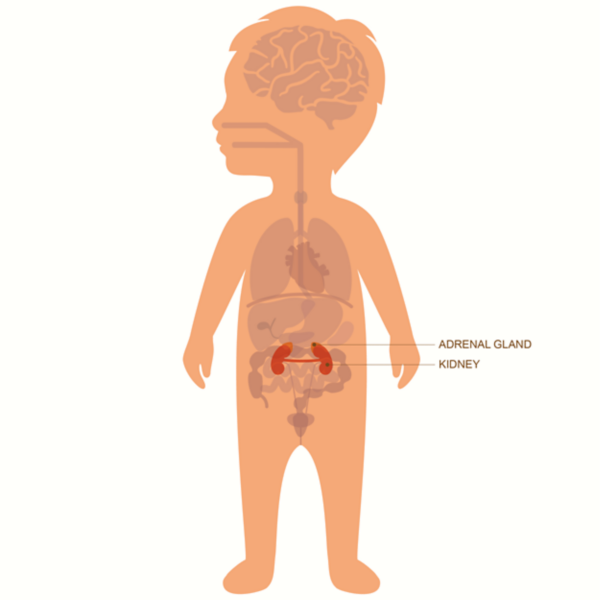
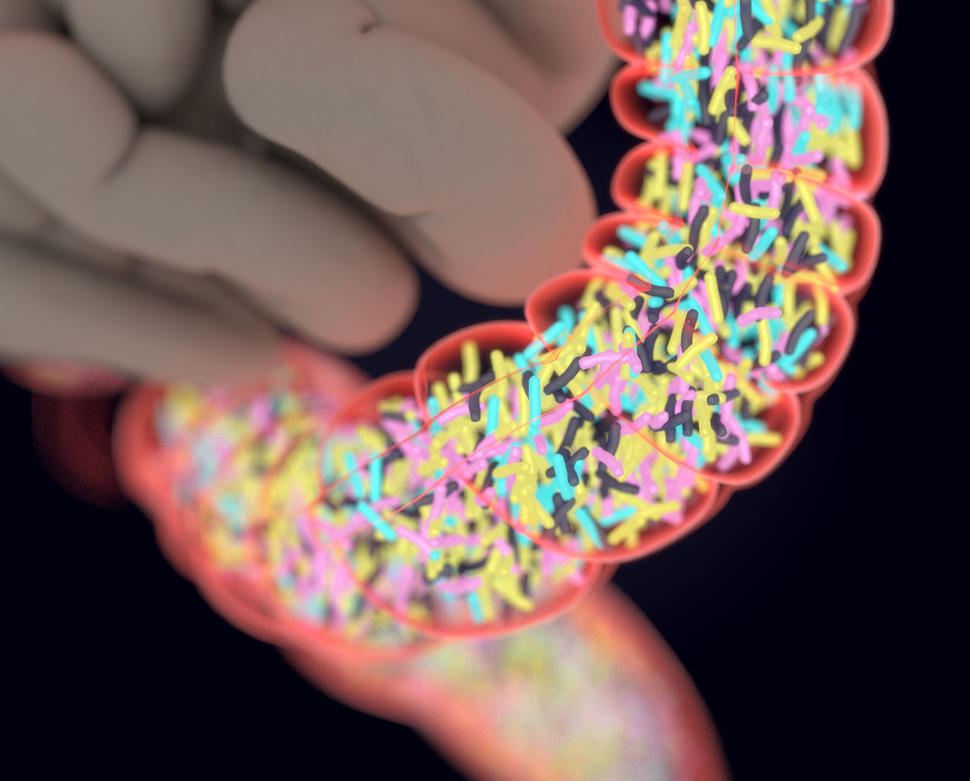




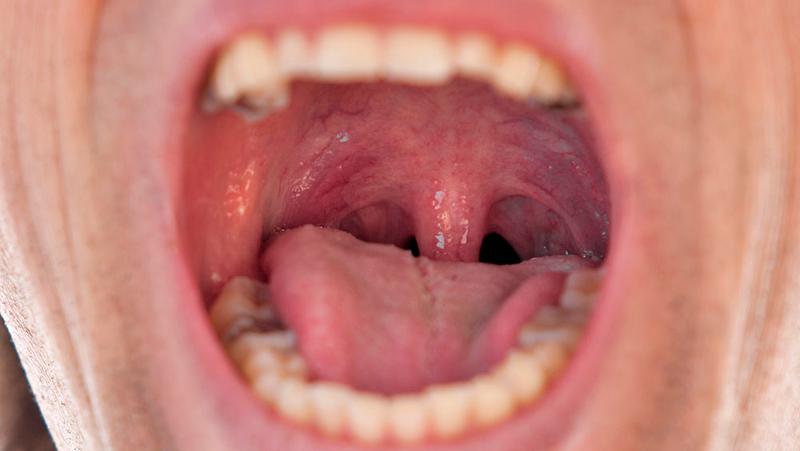
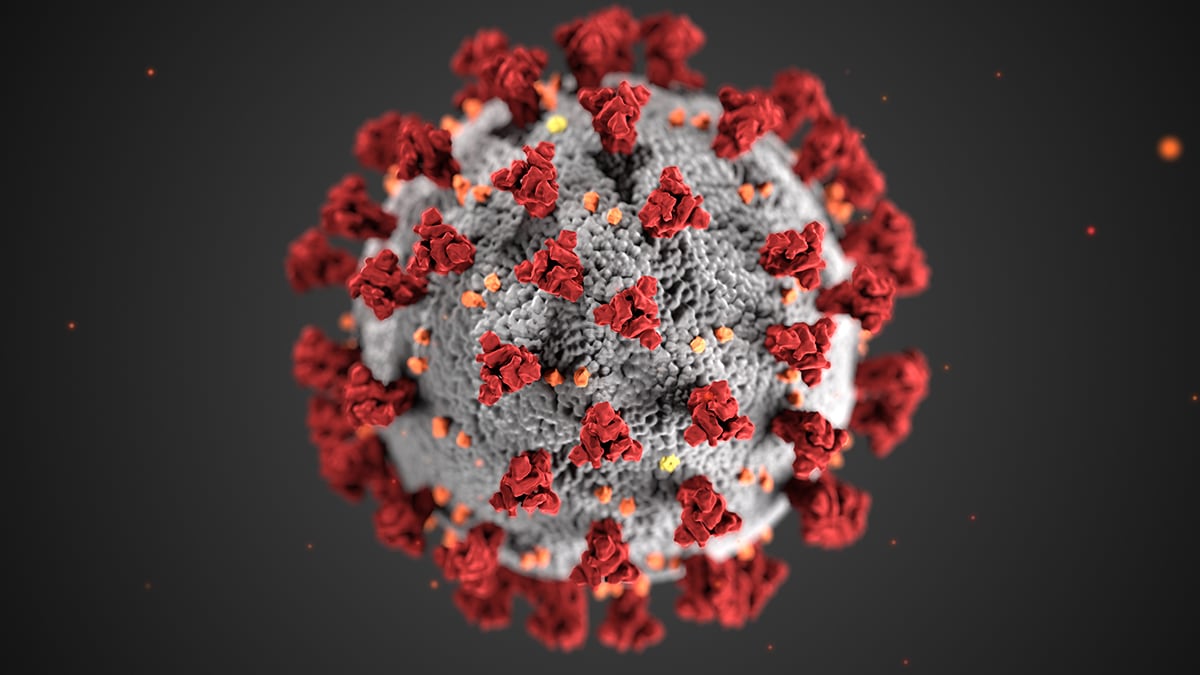







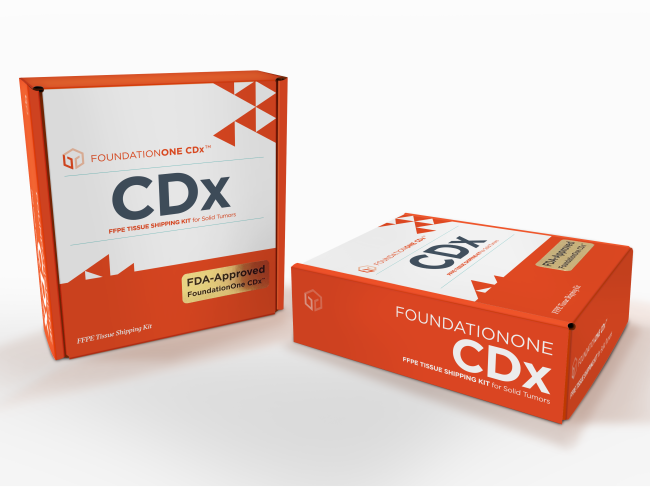

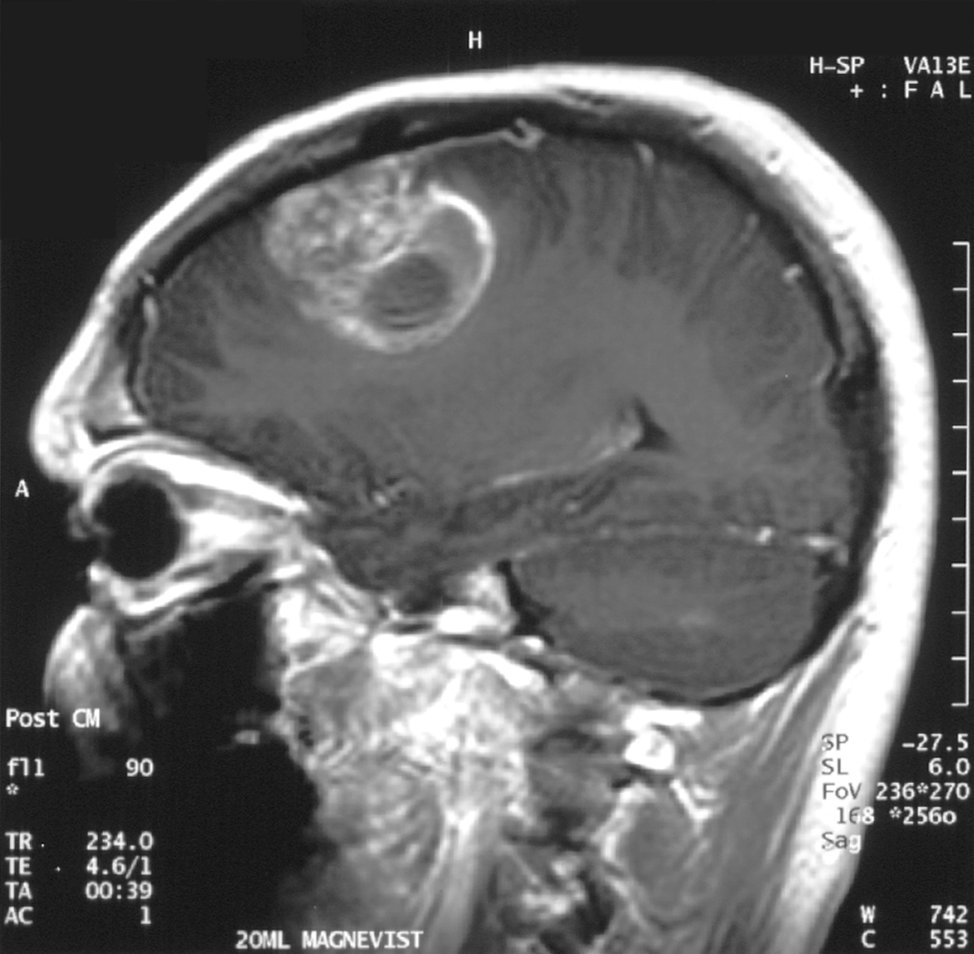
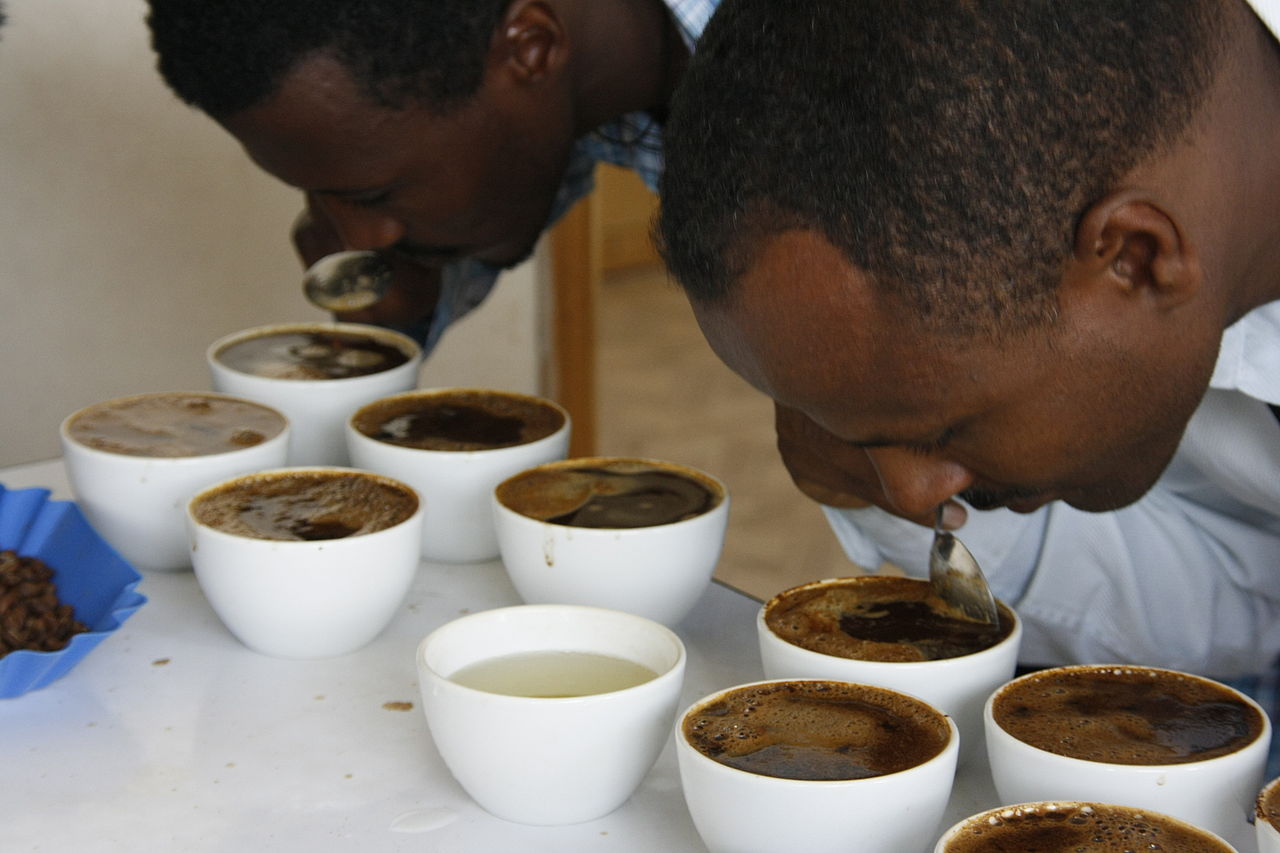









Good day to all am Valeria Miguel Ángel From USA..Texas am so happy sharing this great testimony on here, I was diagnose of Stage IV colon cancer.i was checking for solution in the internet then miraculously i came Across Dr Itua the powerful herbalist that Cure Numerous Diseases such as-Thyroid Cancer,Uterine cancer,Fibroid,Angiopathy, Ataxia,Arthritis,Amyotrophic Lateral Scoliosis,Brain Tumor,Fibromyalgia,Fluoroquinolone ToxicityBladder cancer,Brain cancer,Hiv,Herpes,Esophageal cancer,Gallbladder cancer,Gestational trophoblastic disease,Head and neck cancer,Hodgkin lymphoma
ReplyDeleteIntestinal cancer,Kidney cancer,Hpv,Lung cancer,Melanoma,Mesothelioma,Multiple myeloma,Neuroendocrine tumors
Non-Hodgkin lymphoma,Oral cancer,Ovarian cancer,Sinus cancer,Hepatitis A,B/C,Skin cancer,Soft tissue sarcoma,Pancreative Cancer,Spinal cancer,Stomach cancer,Vaginal cancer,Vulvar cancer,
Testicular cancer,Tach Diseases,Leukemia,Liver cancer,Throat cancer,
Syndrome Fibrodysplasia Ossificans ProgresSclerosis,Alzheimer's disease,Chronic Diarrhea,Copd,Parkinson,Als,Adrenocortical carcinoma Infectious mononucleosis. ,so I contacted him base on the testimonies I?m seeing about him on the internet, I was cured too by him, kindly contact him today through his email he can help you..drituaherbalcenter@gmail.com and his herbal medicines will set you free from any human diseases,all thank to you Dr Itua for your kindly help in my life his Mobile number Whatsapp.+2348149277967